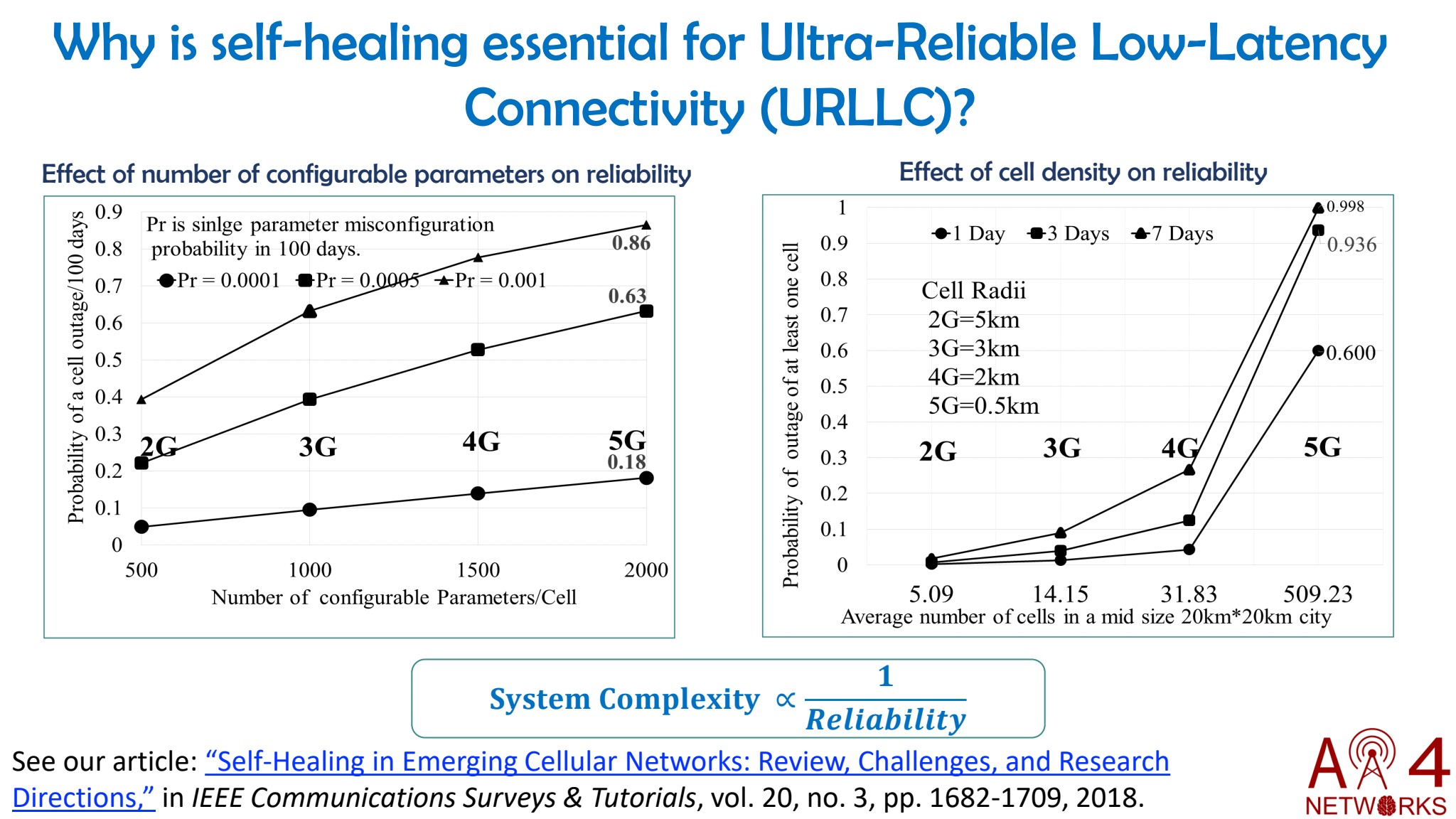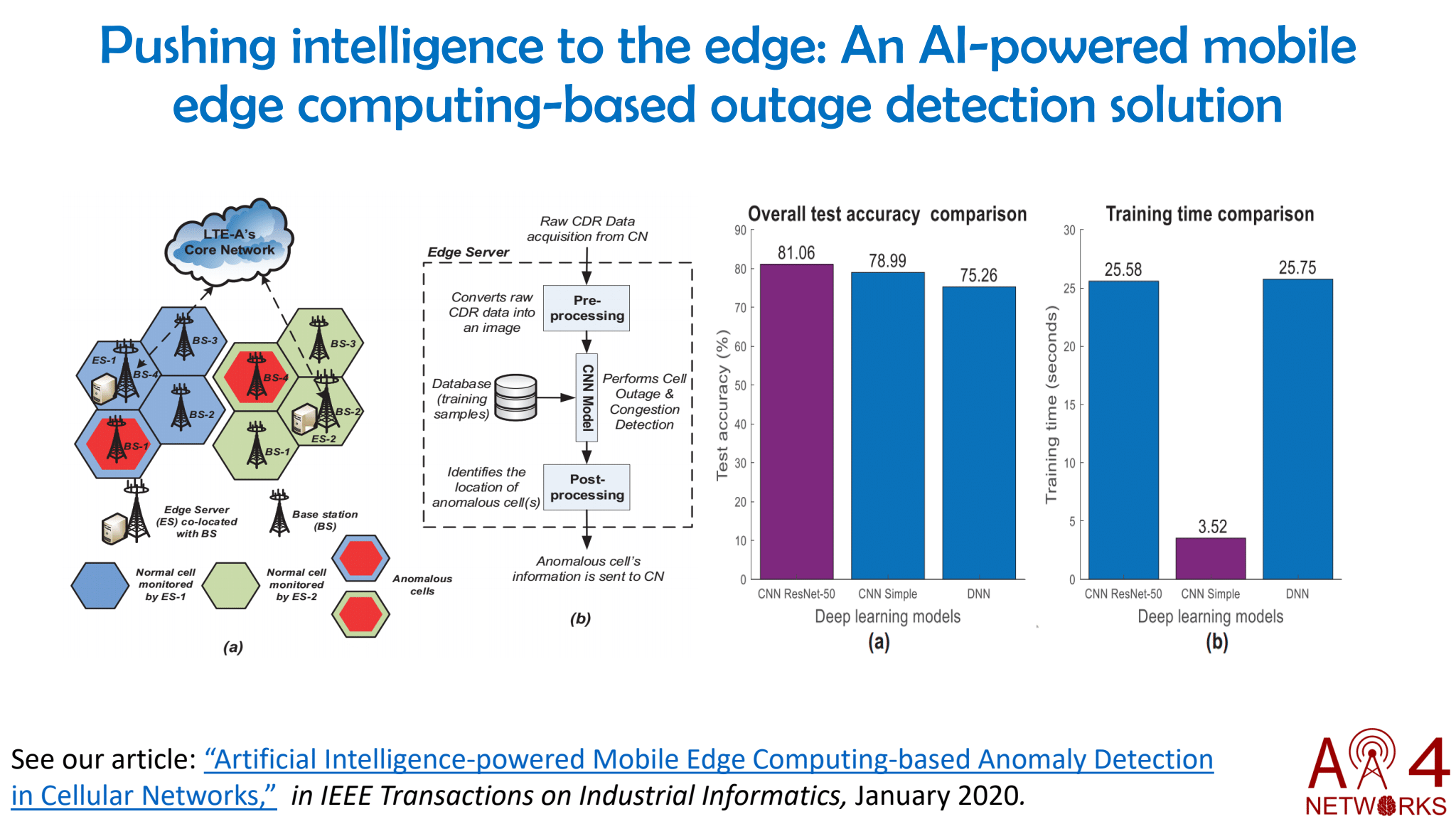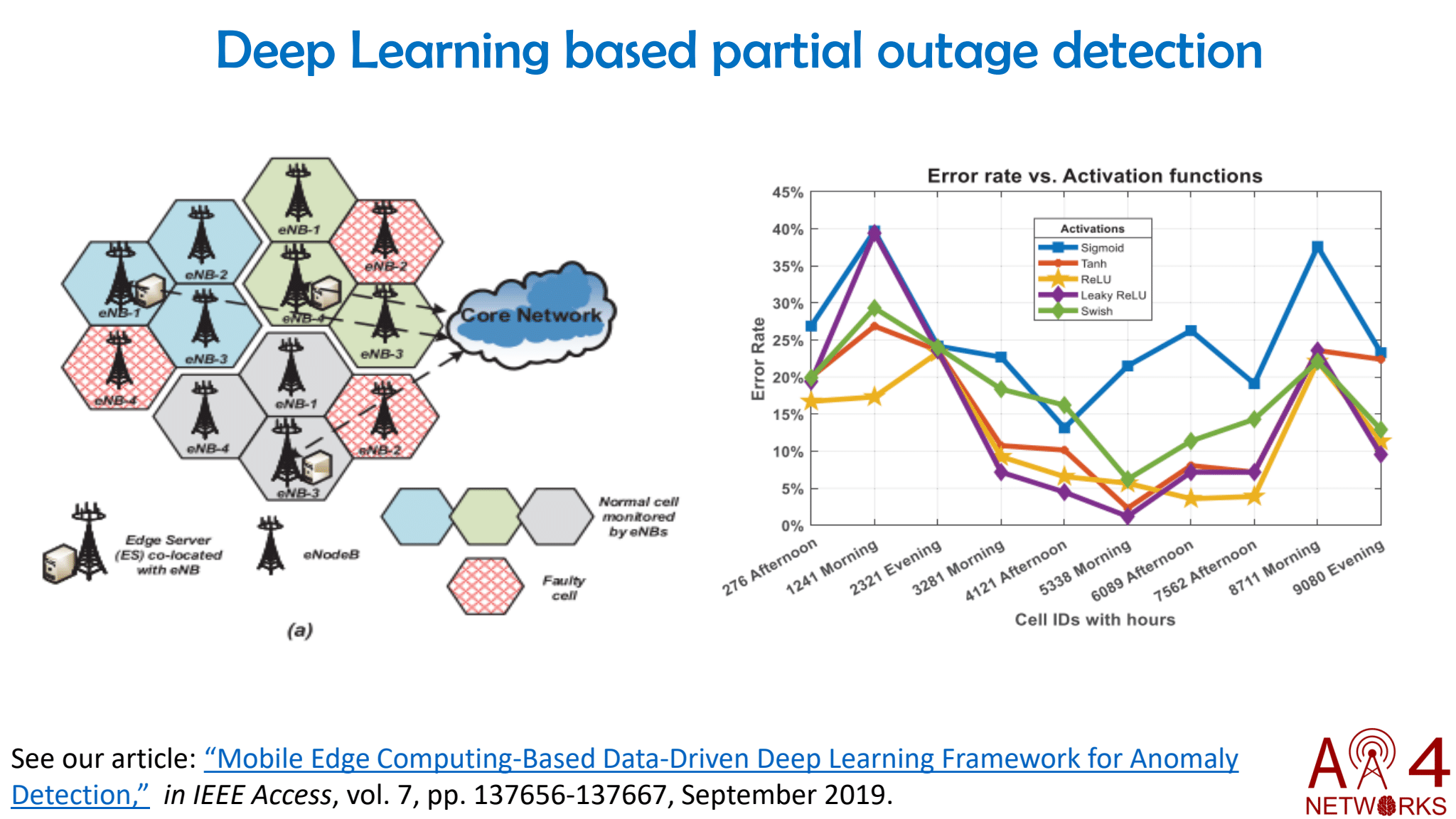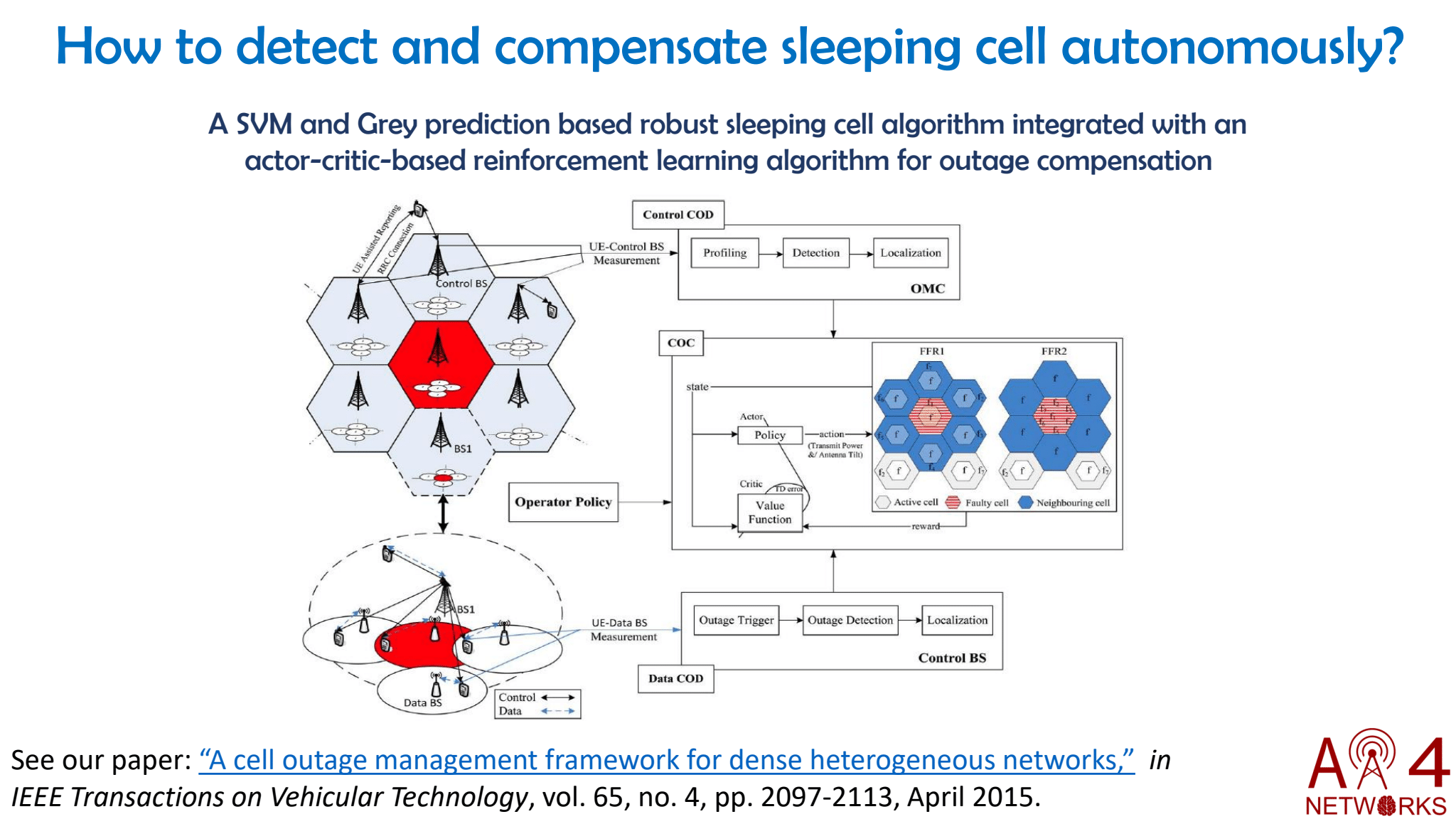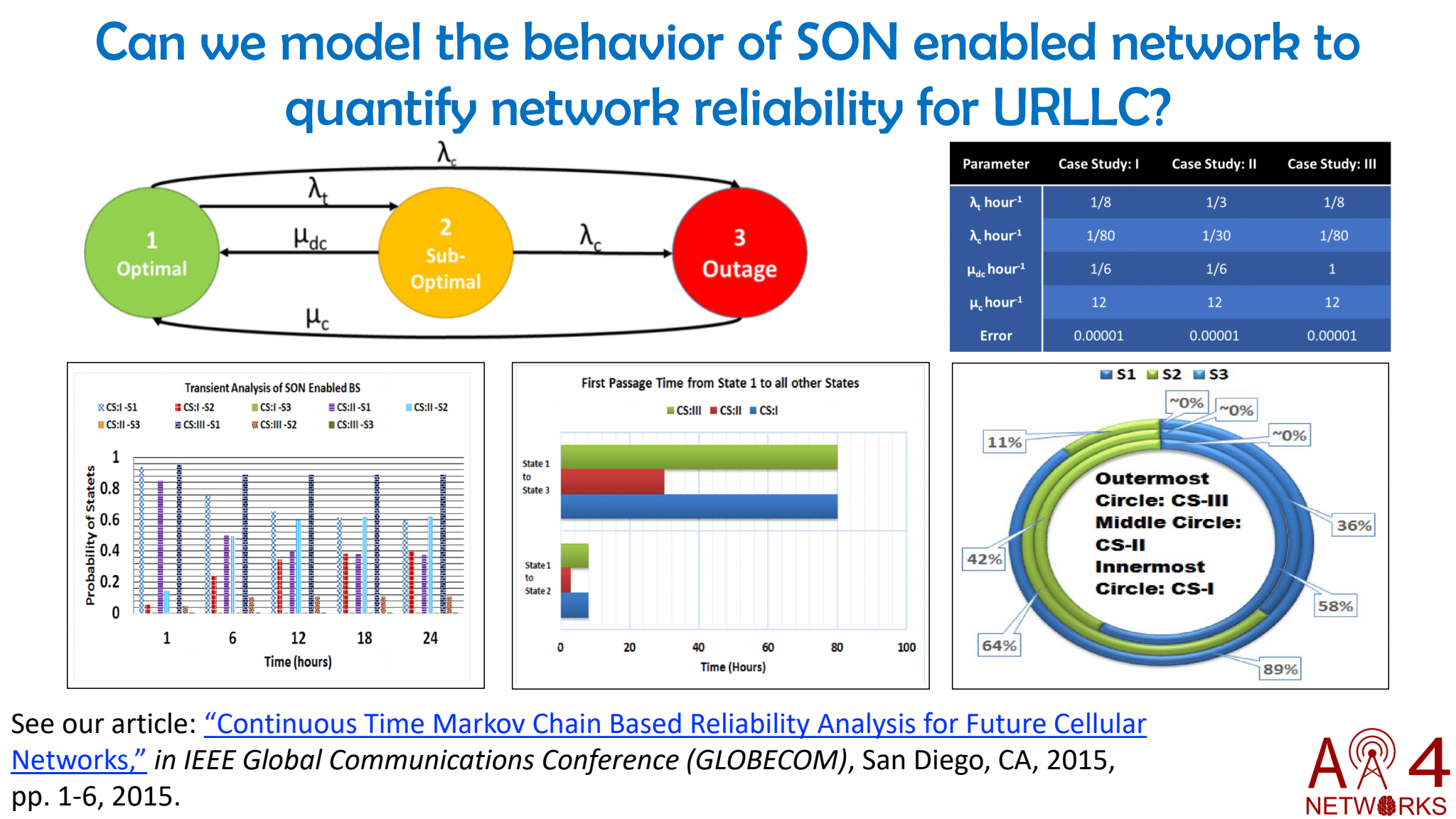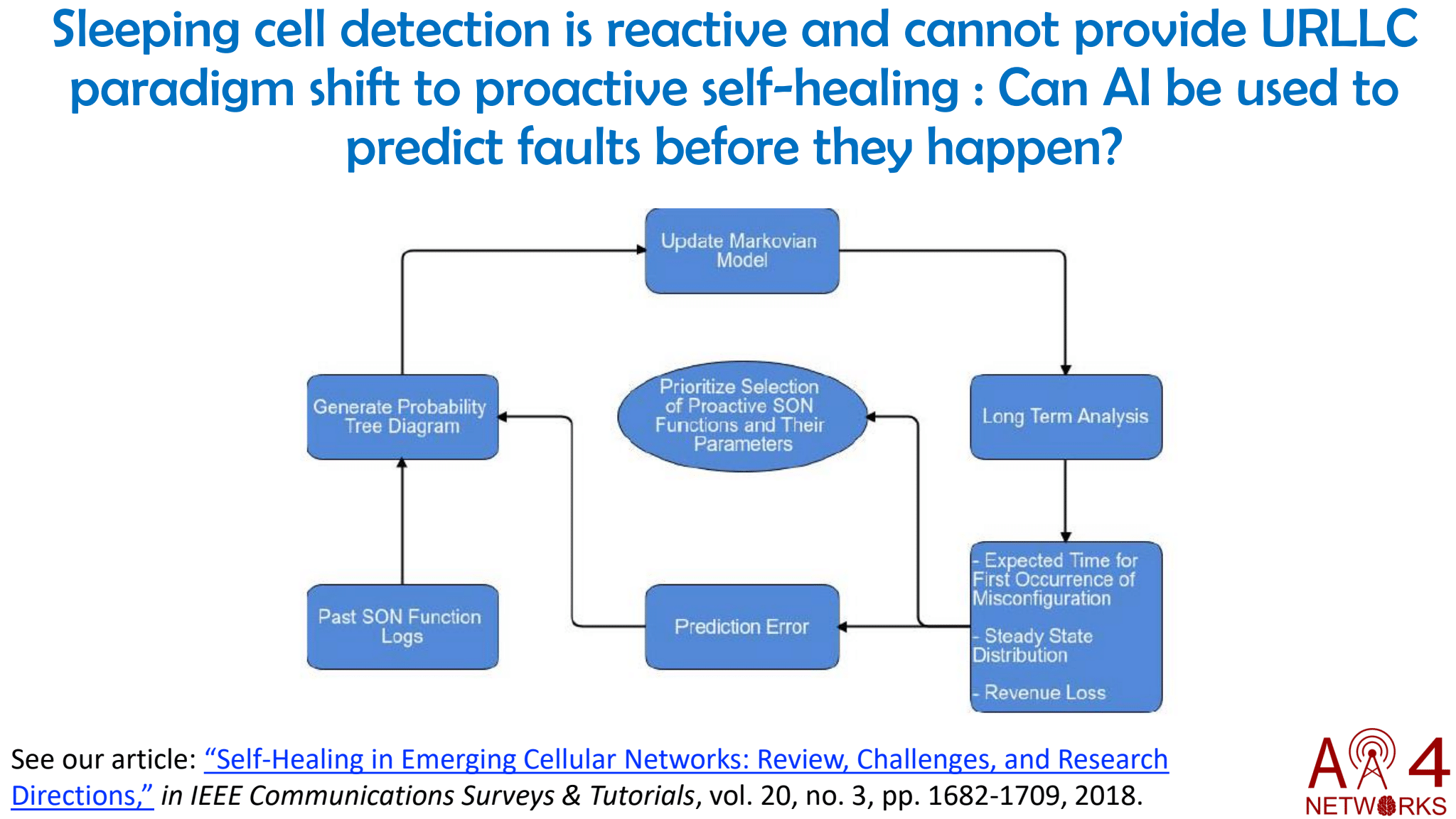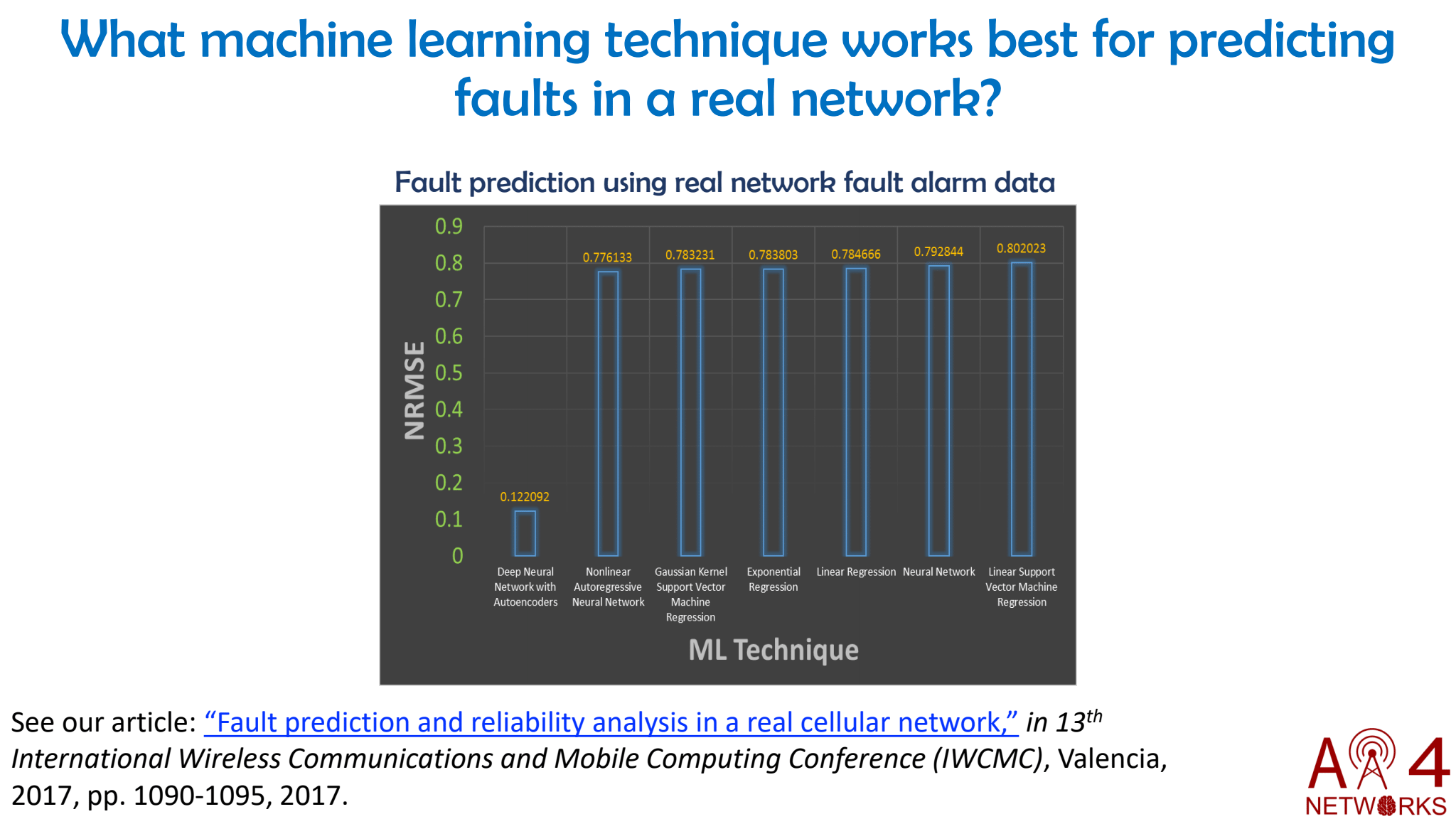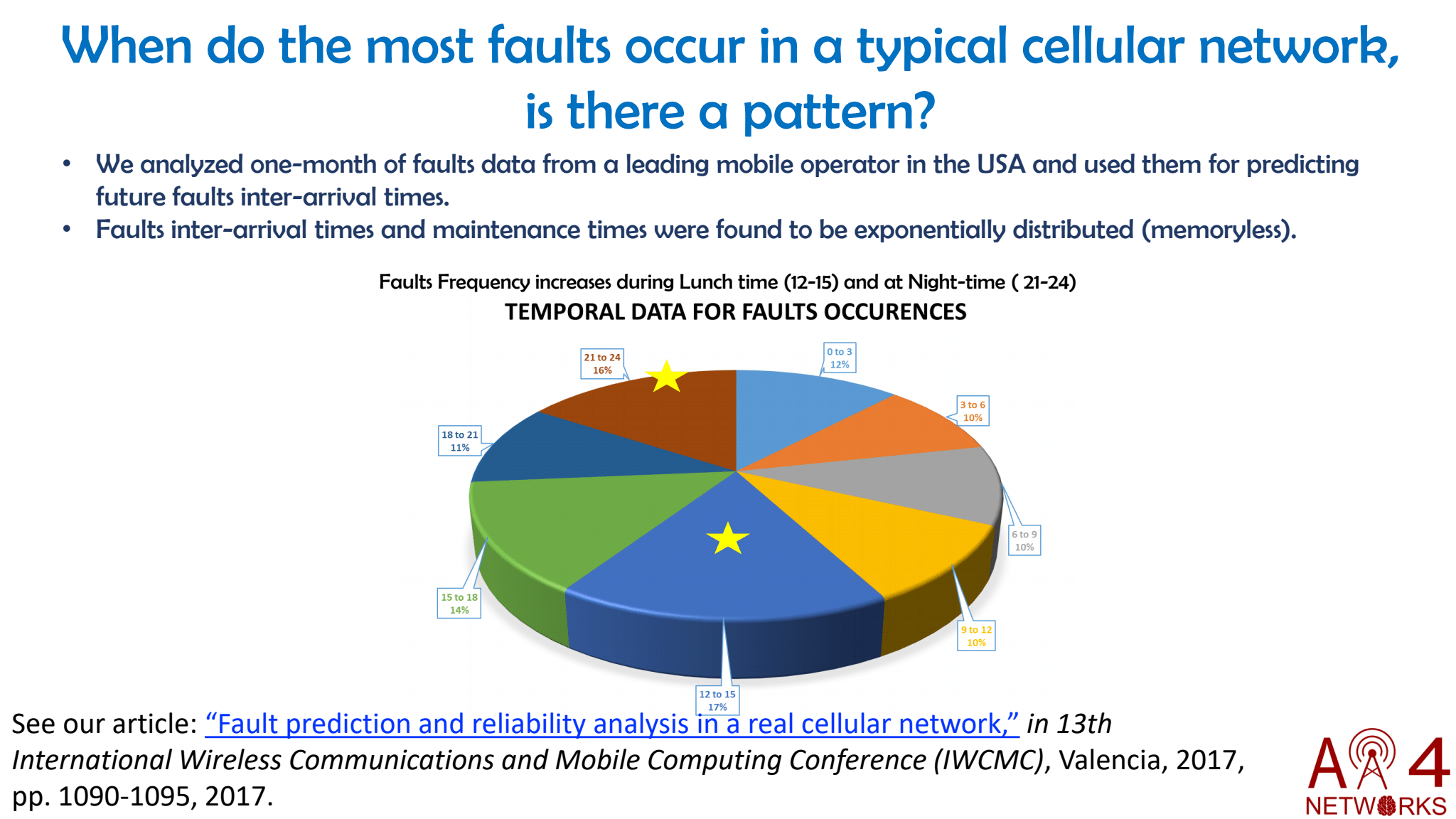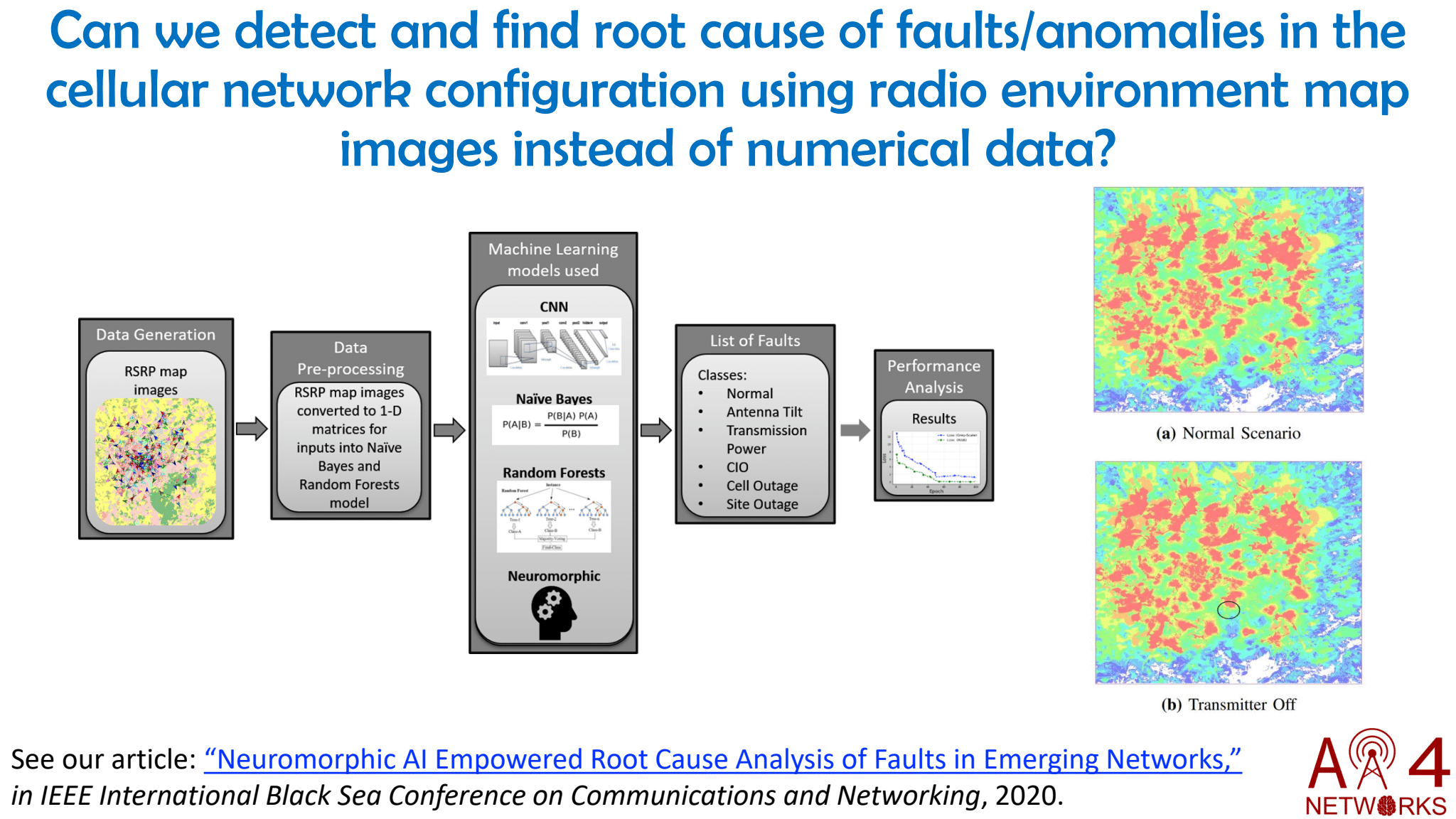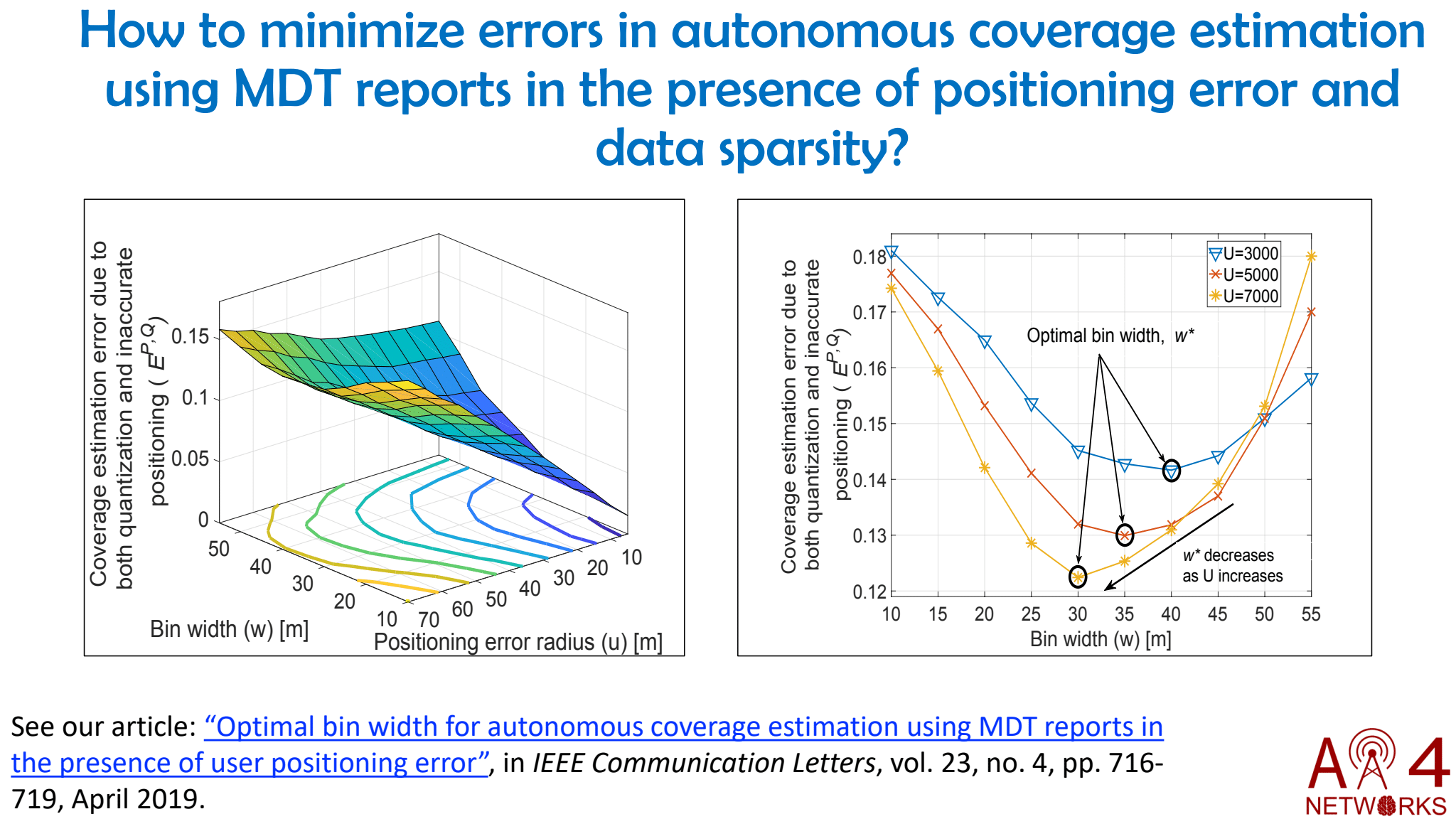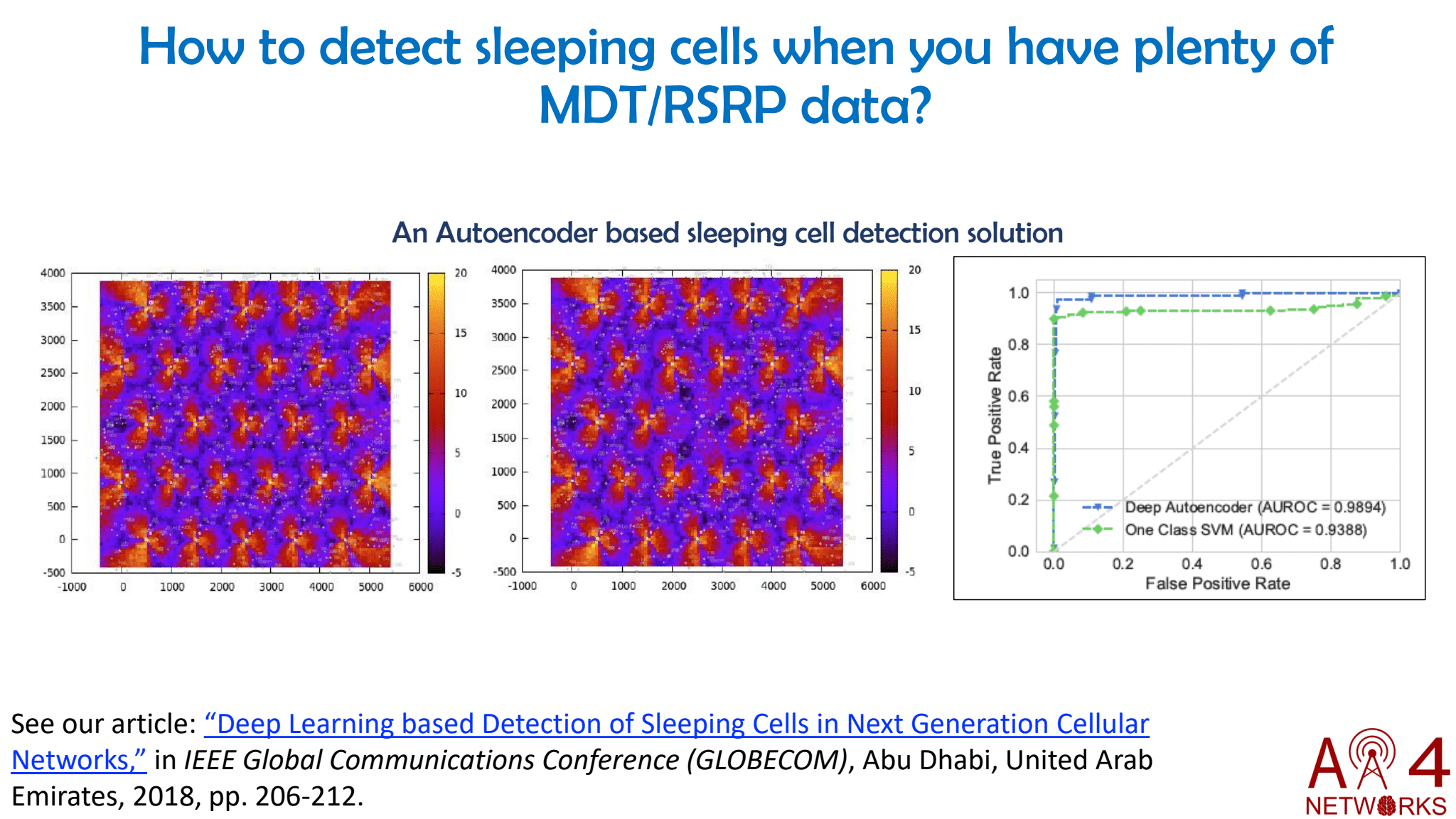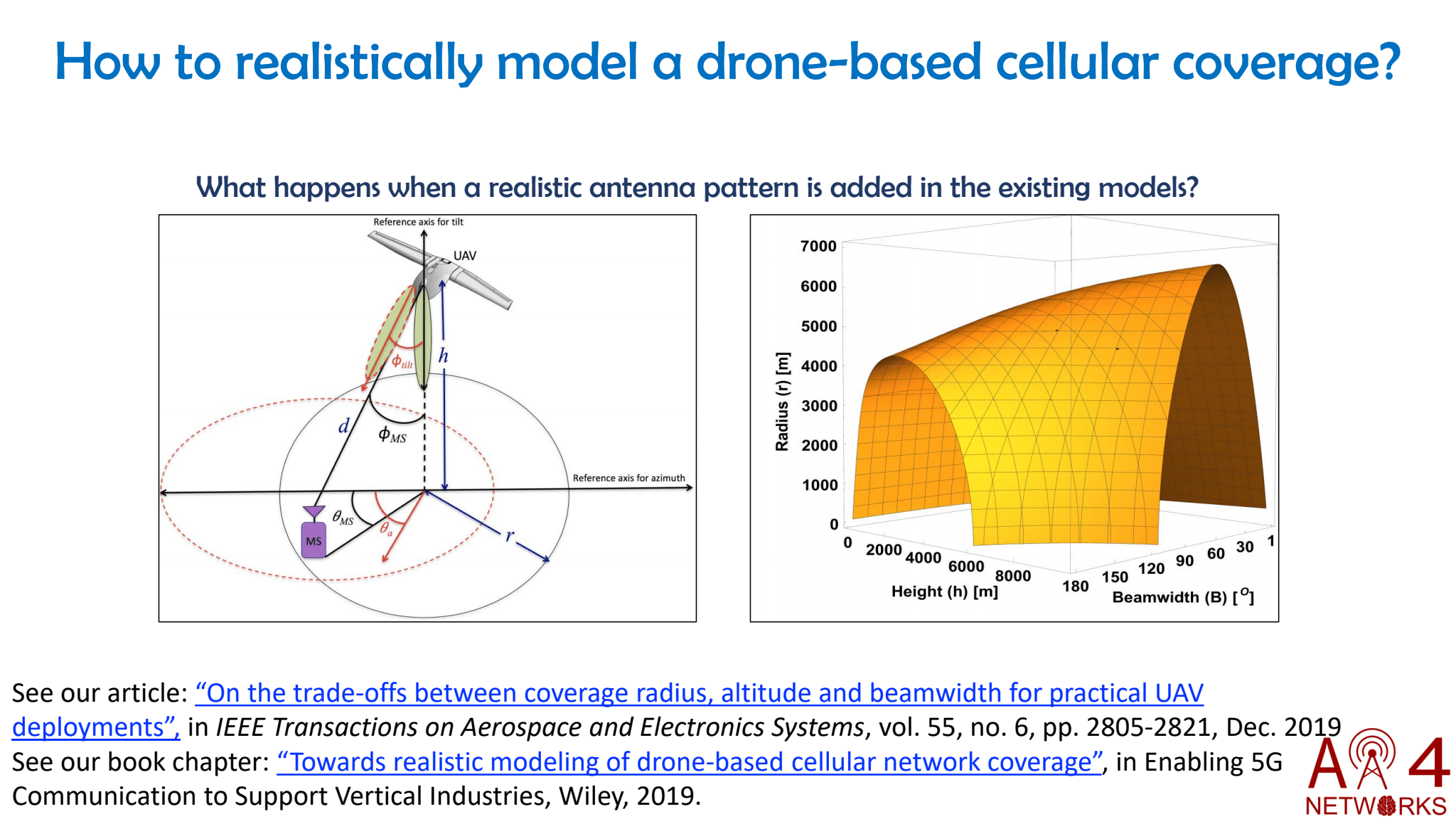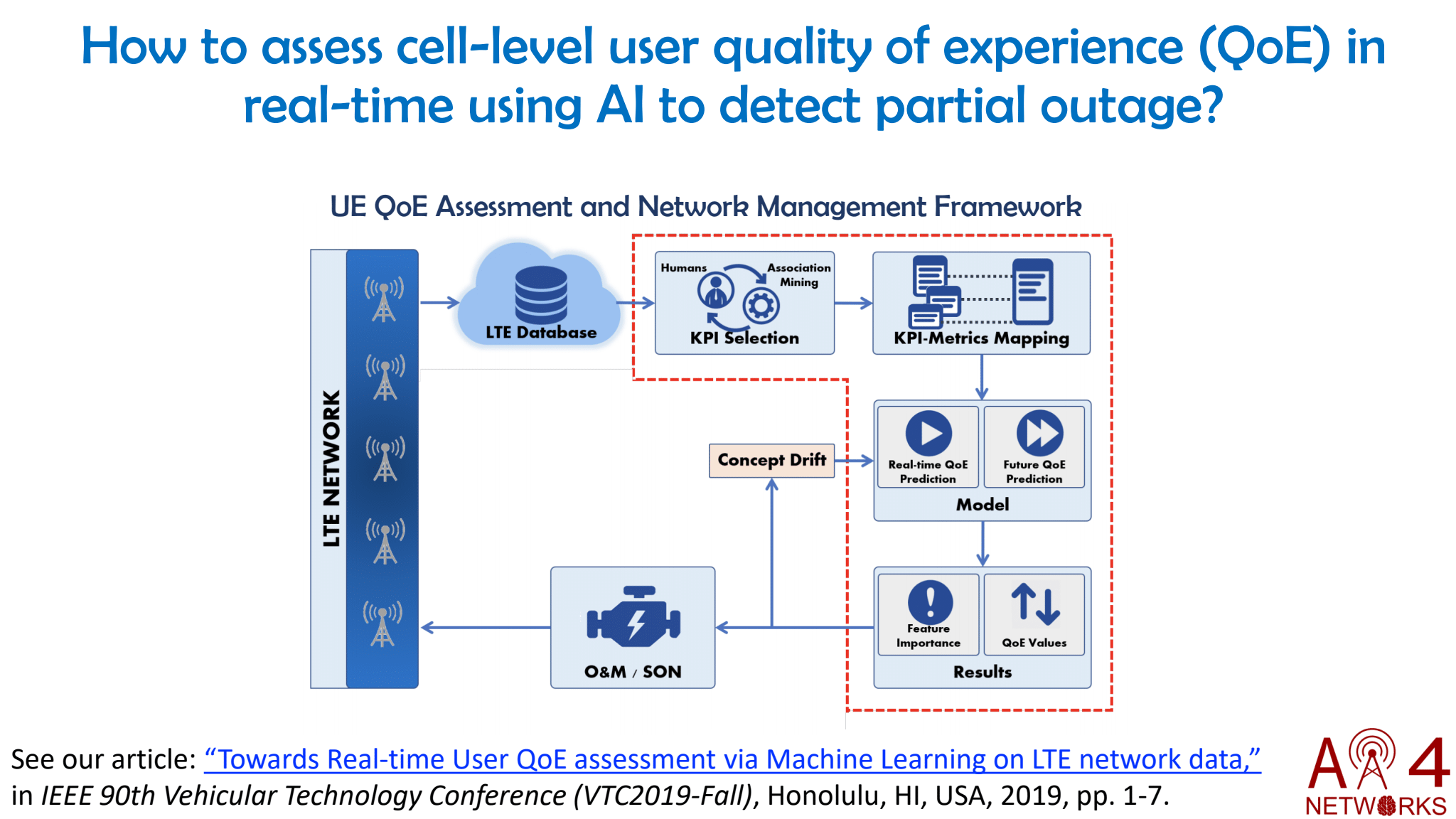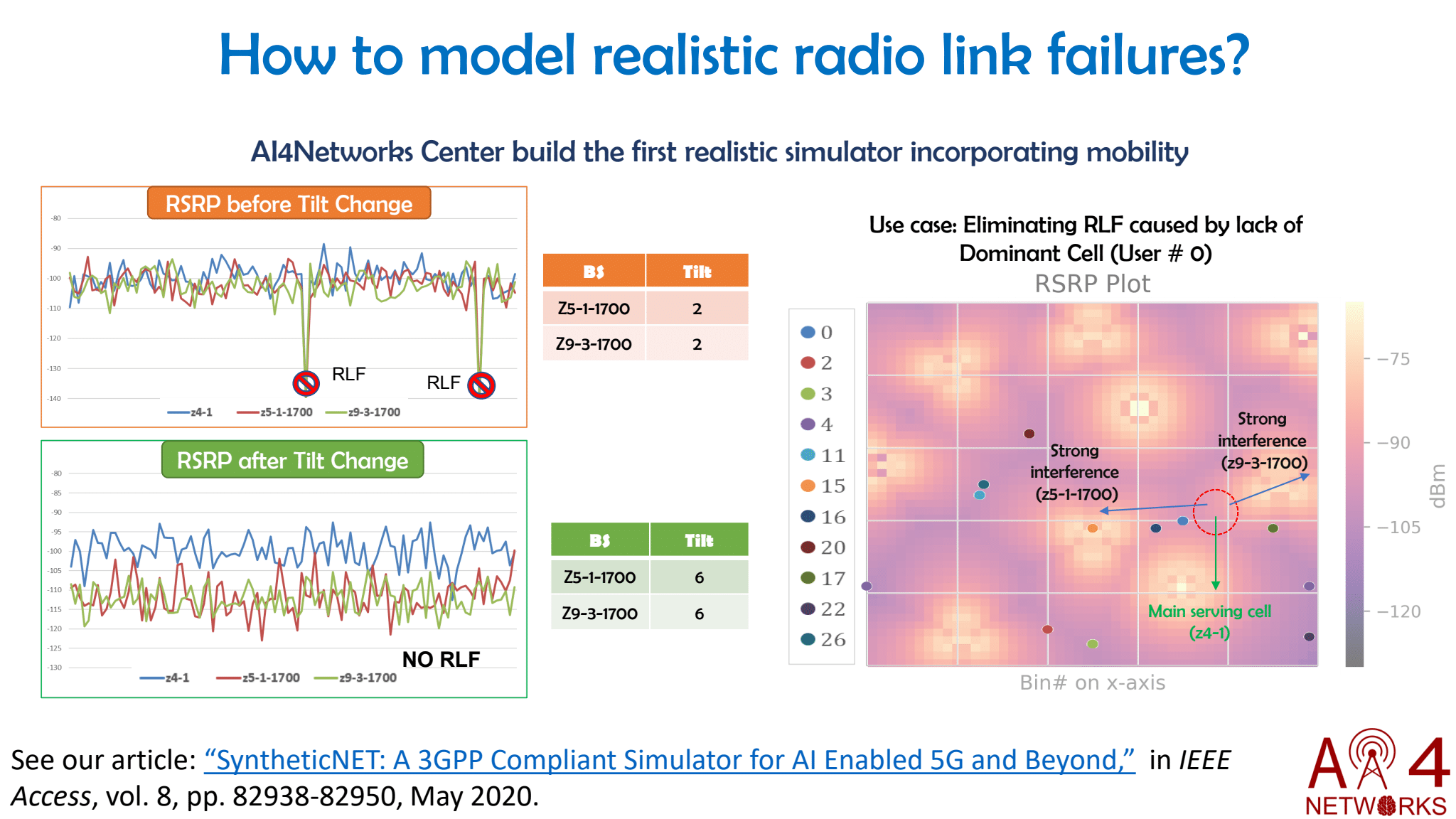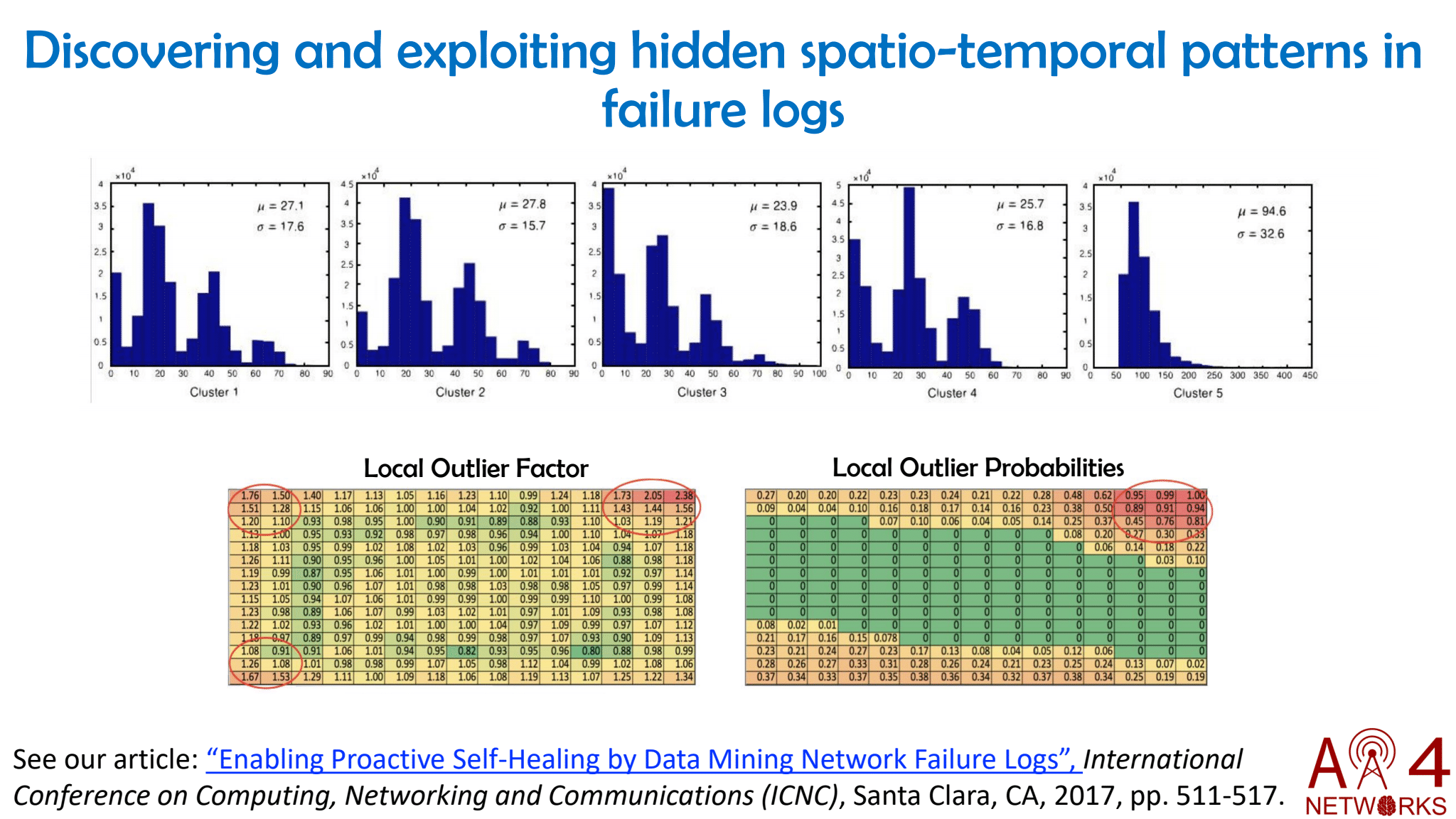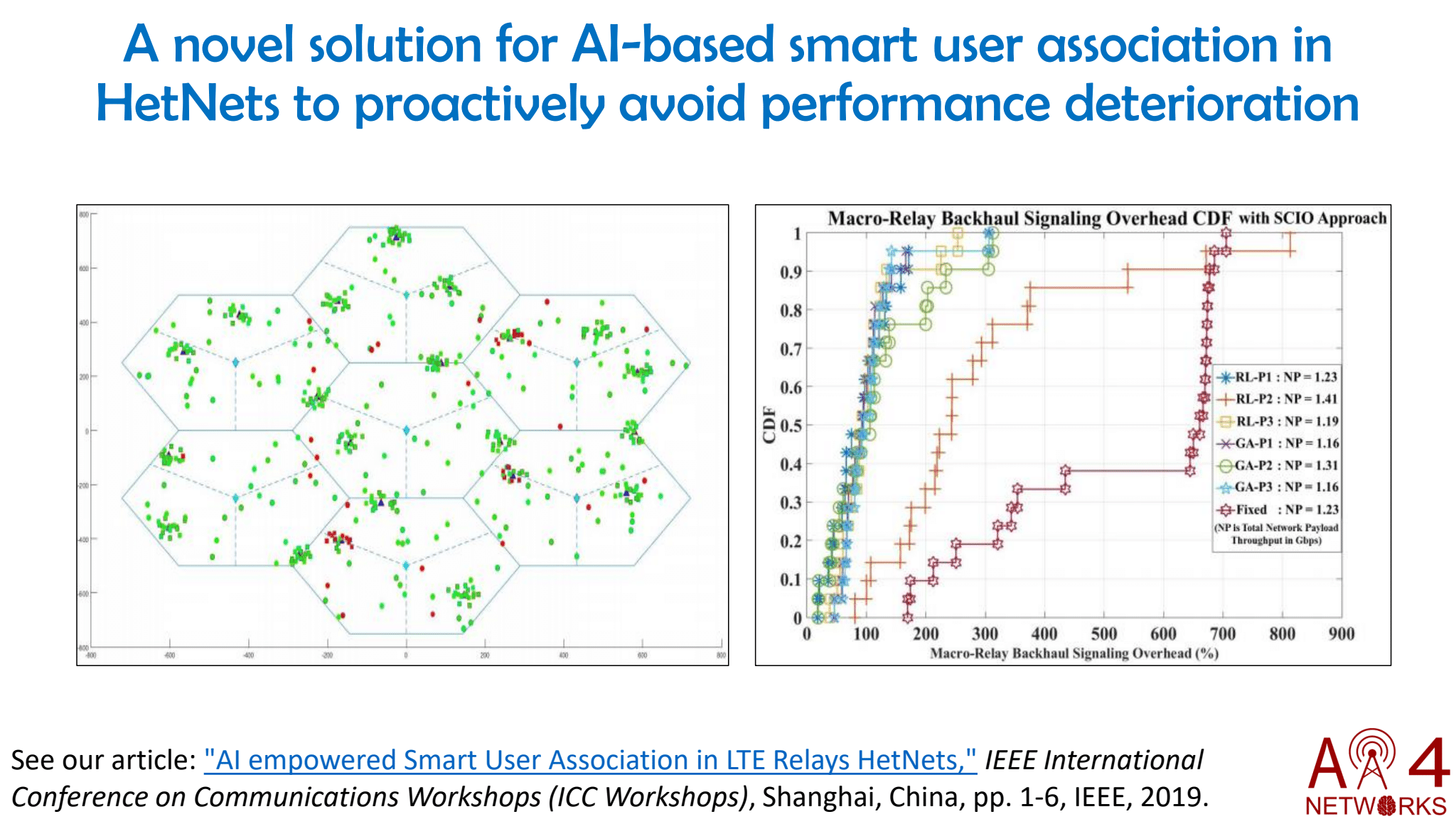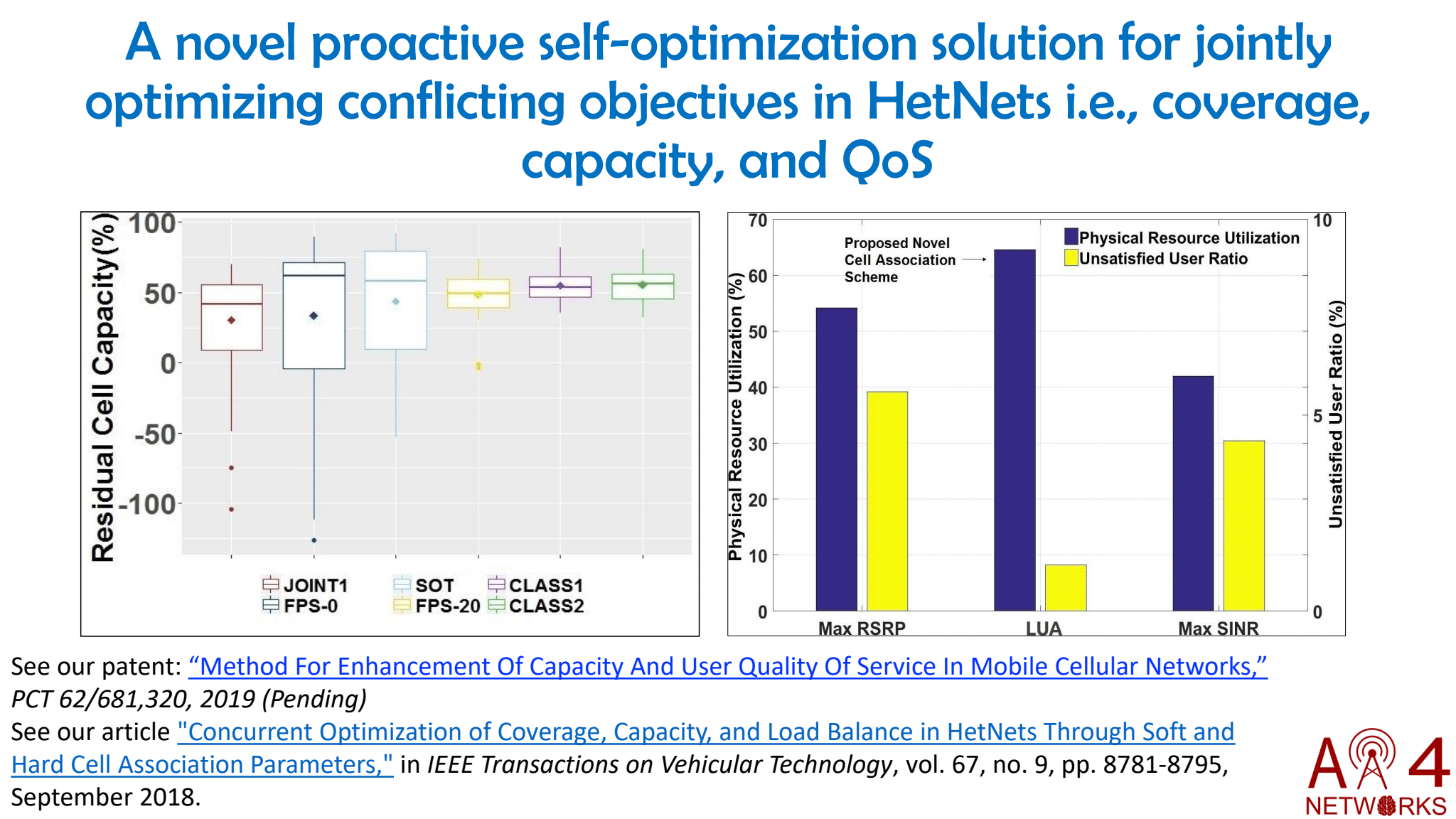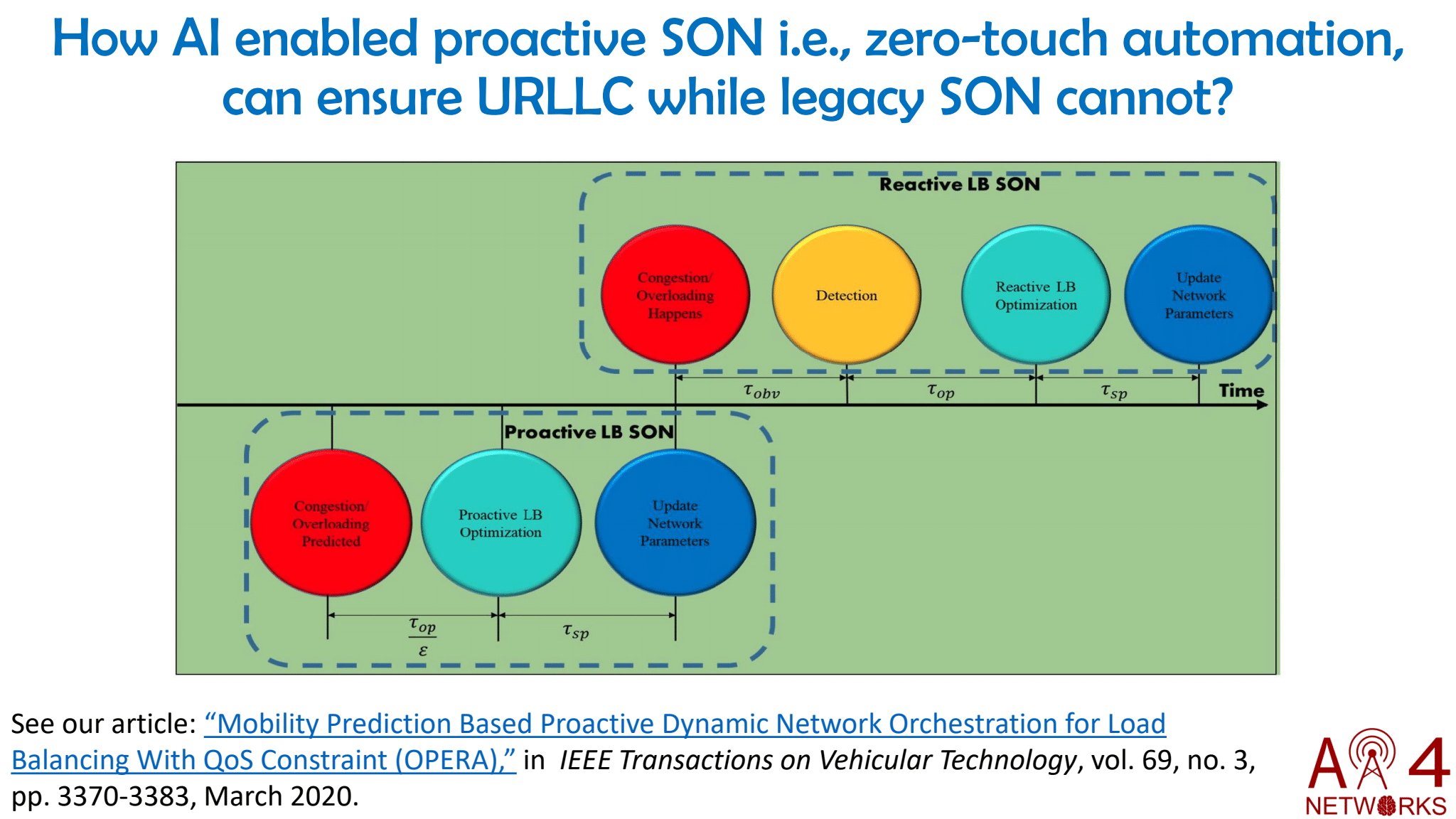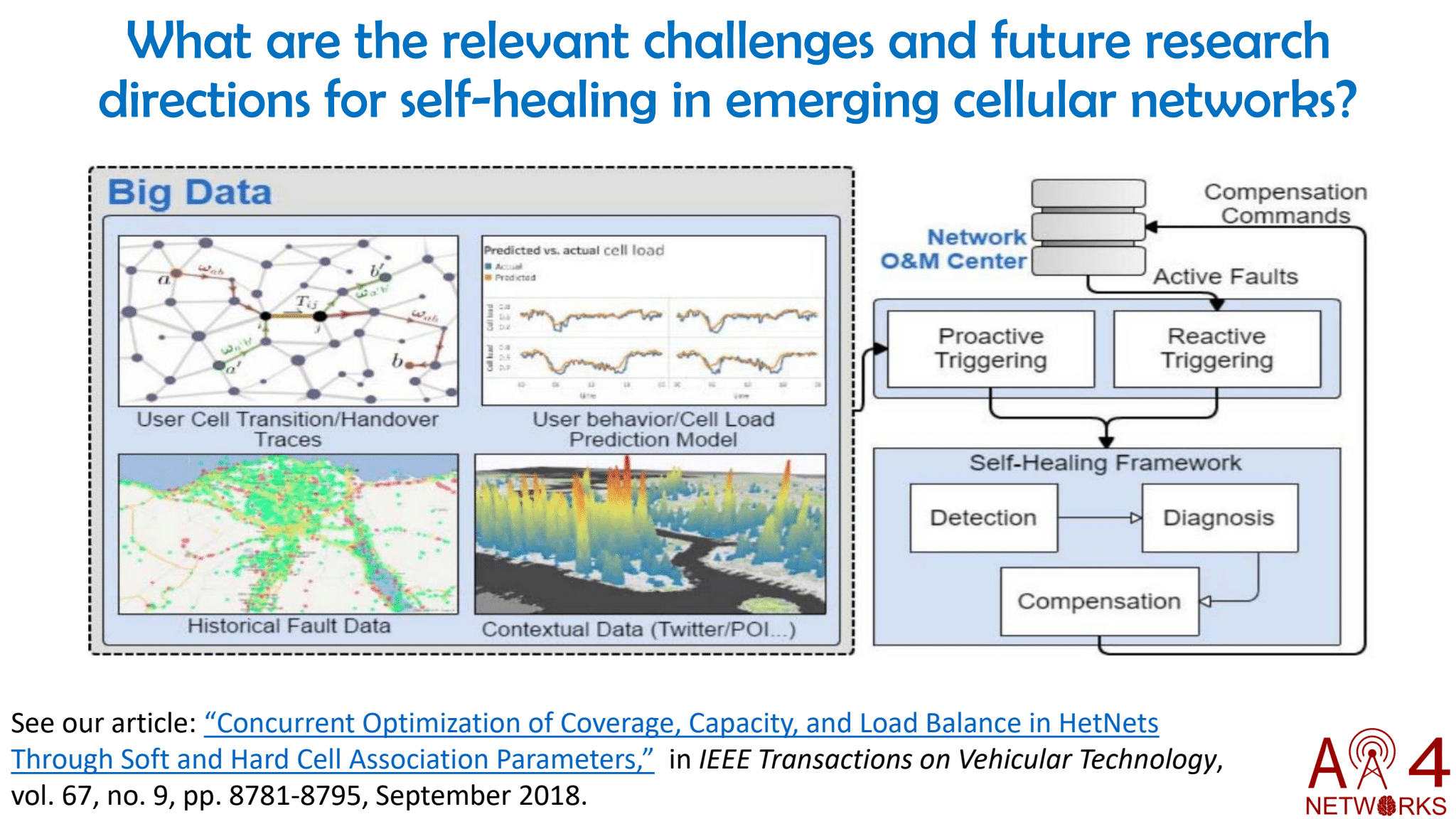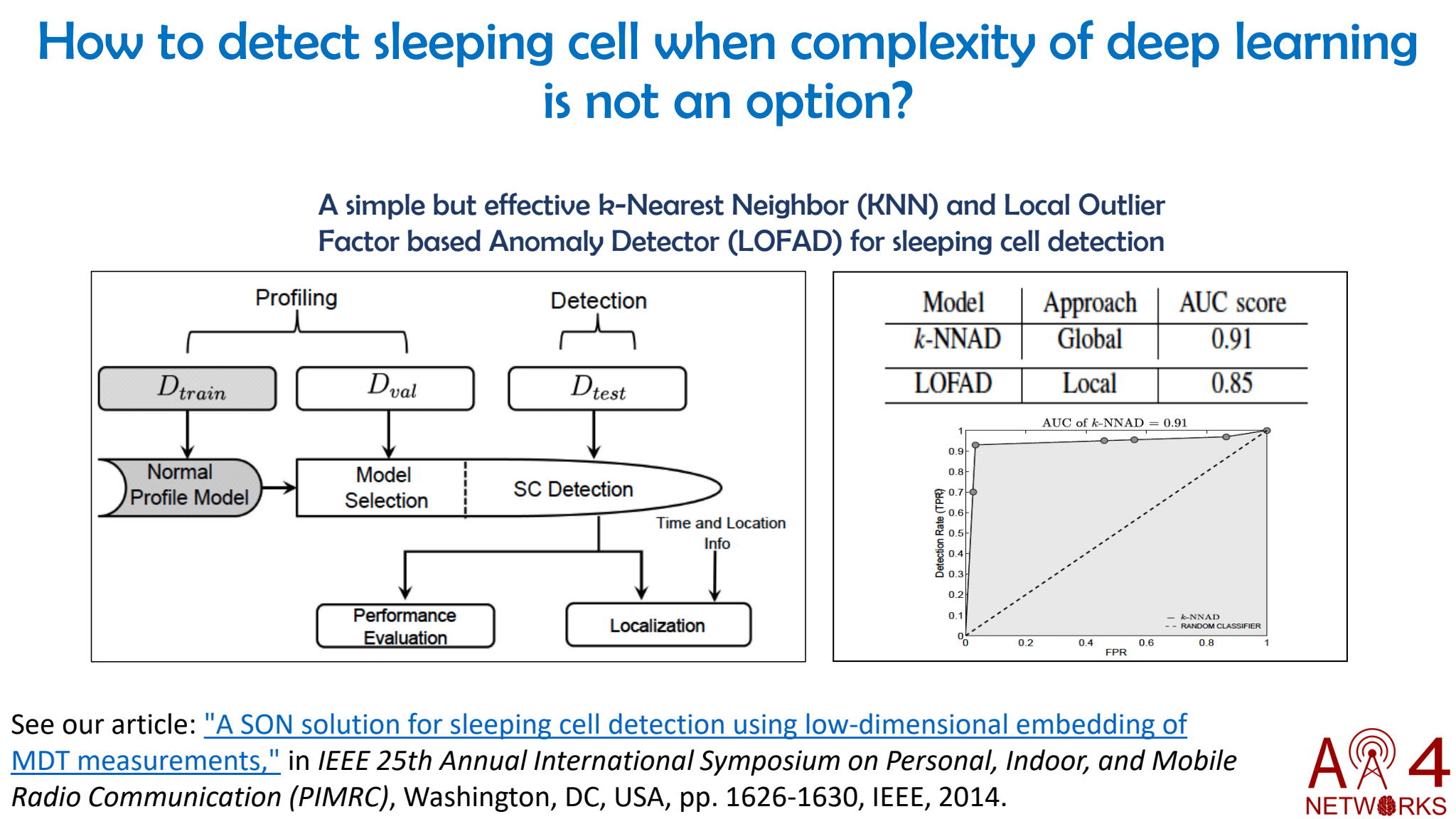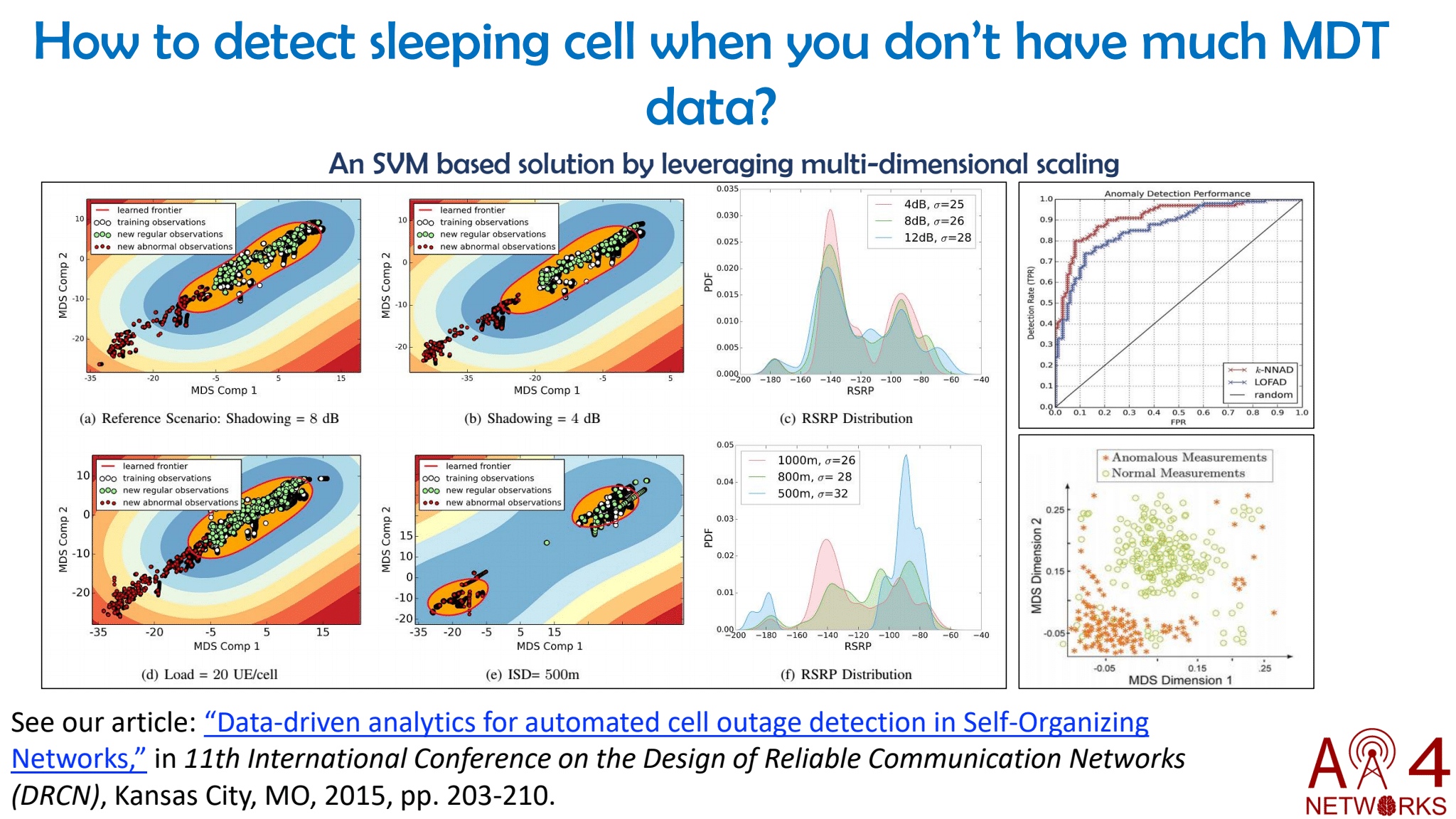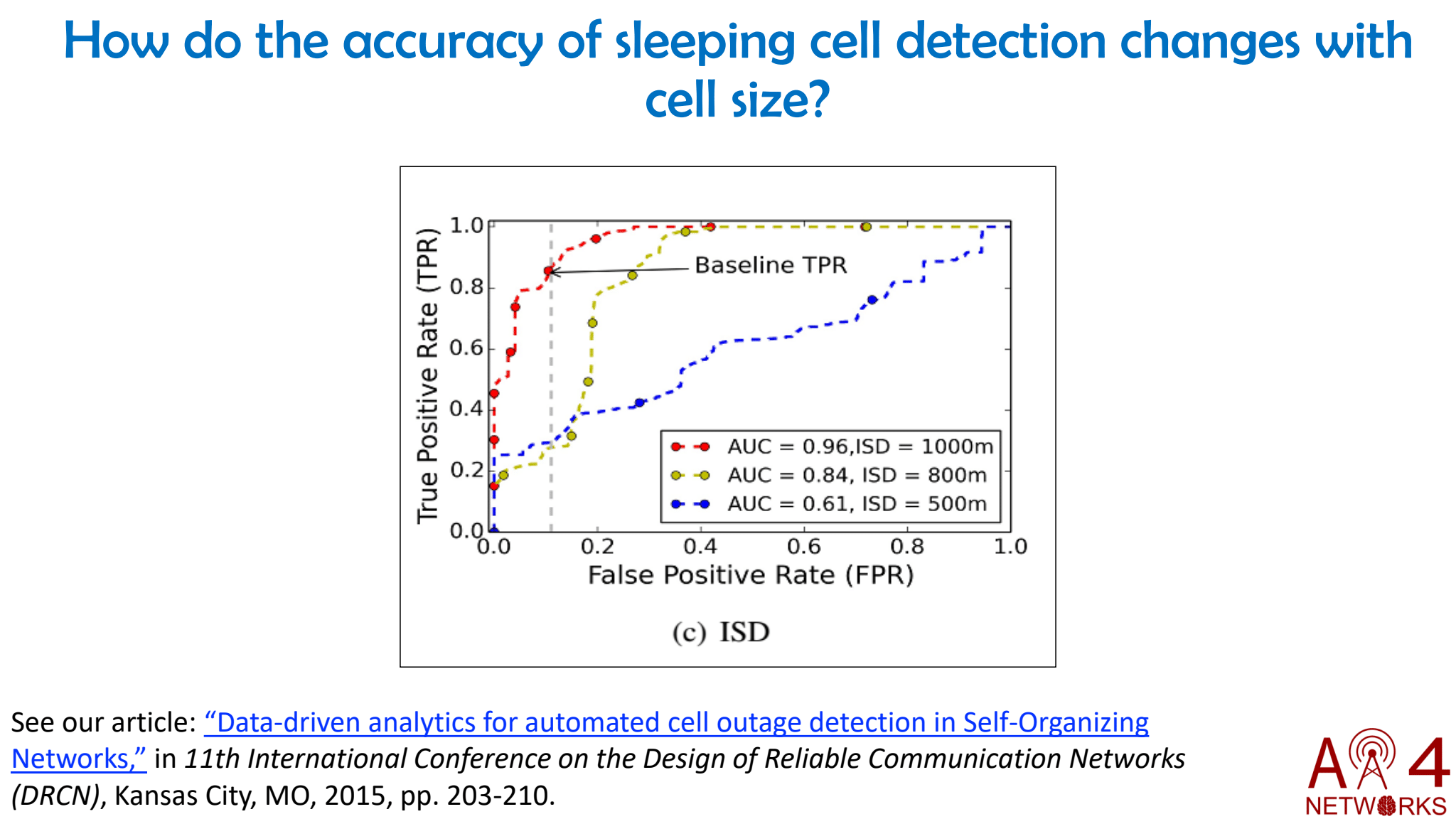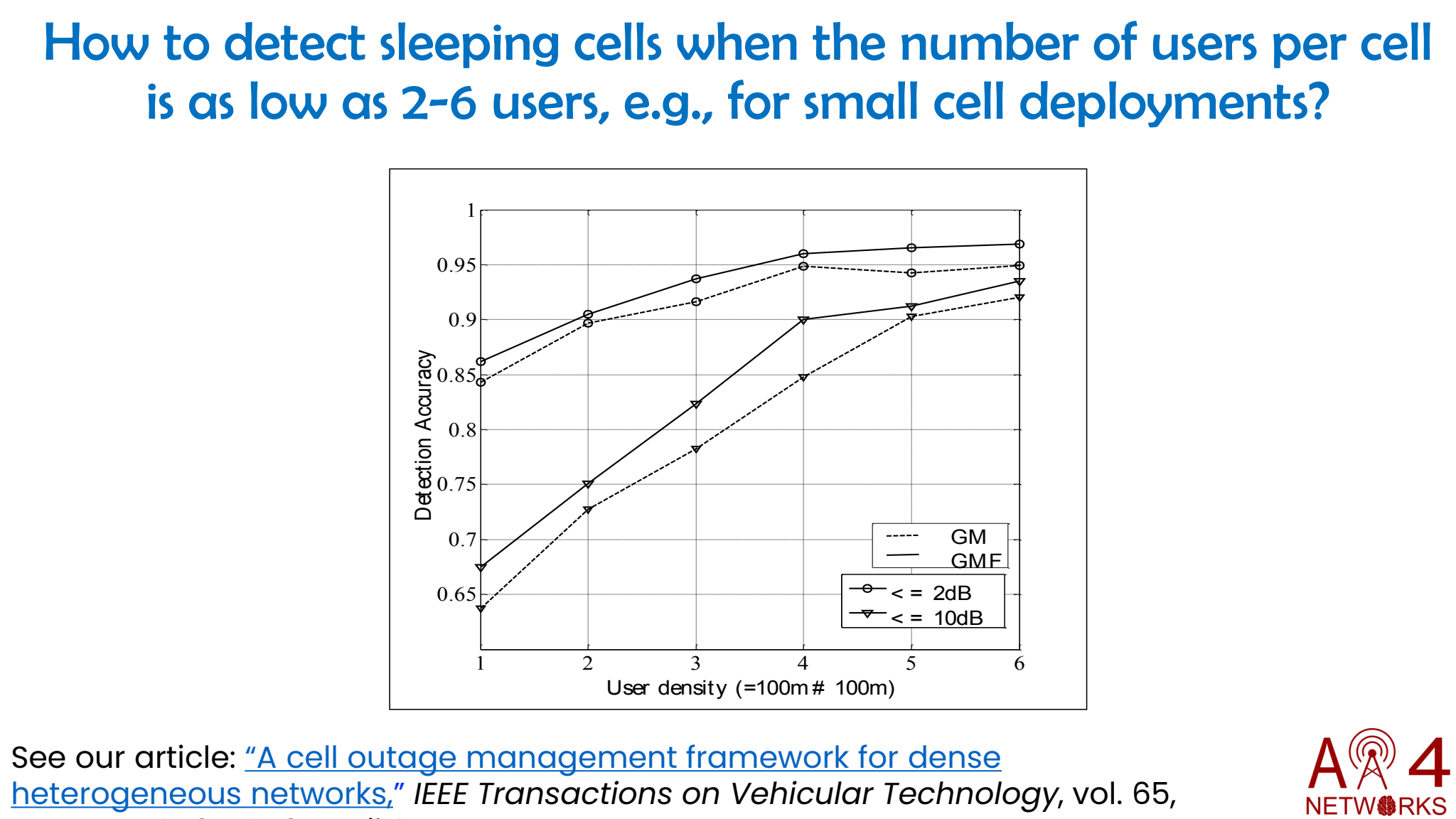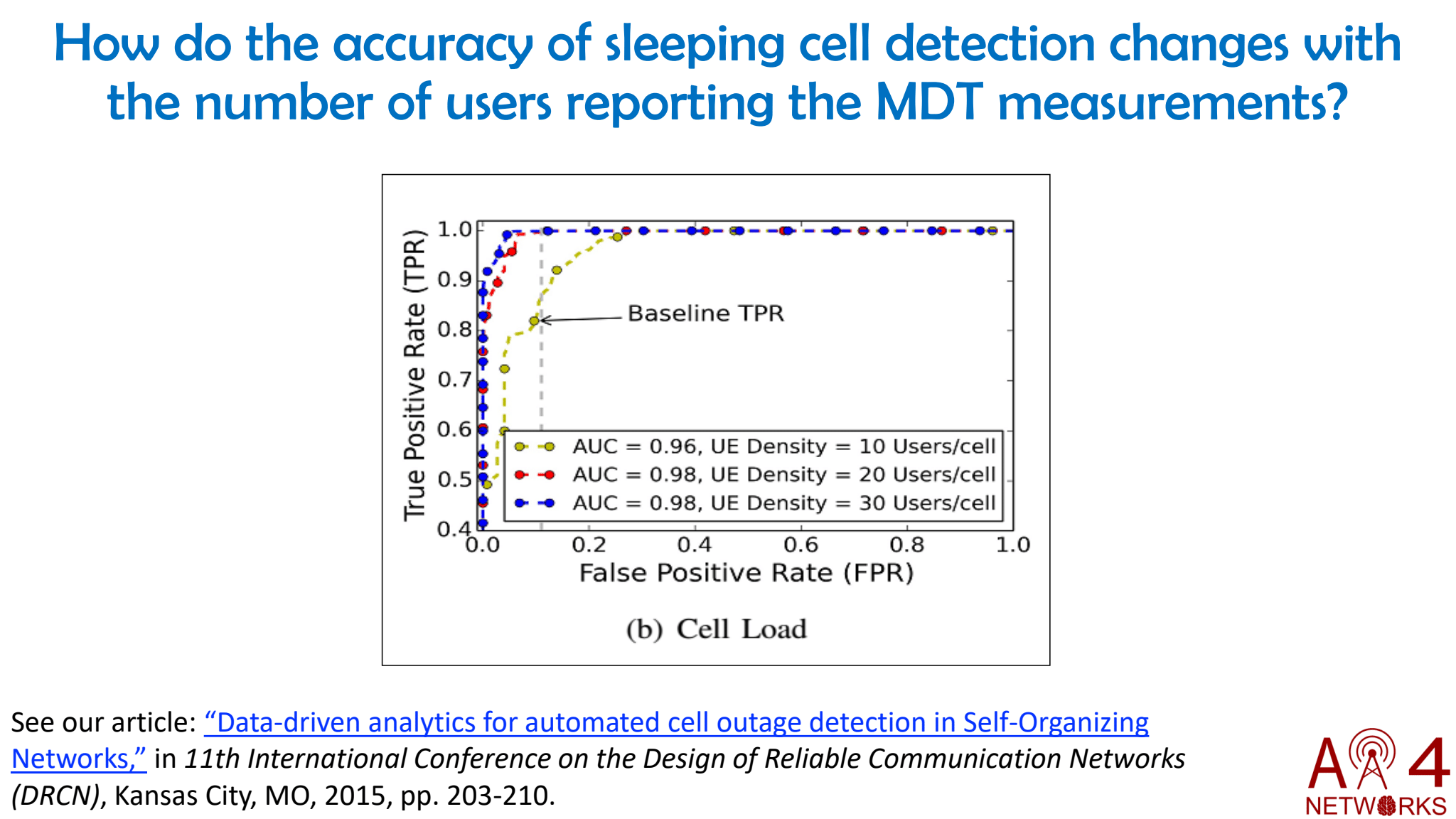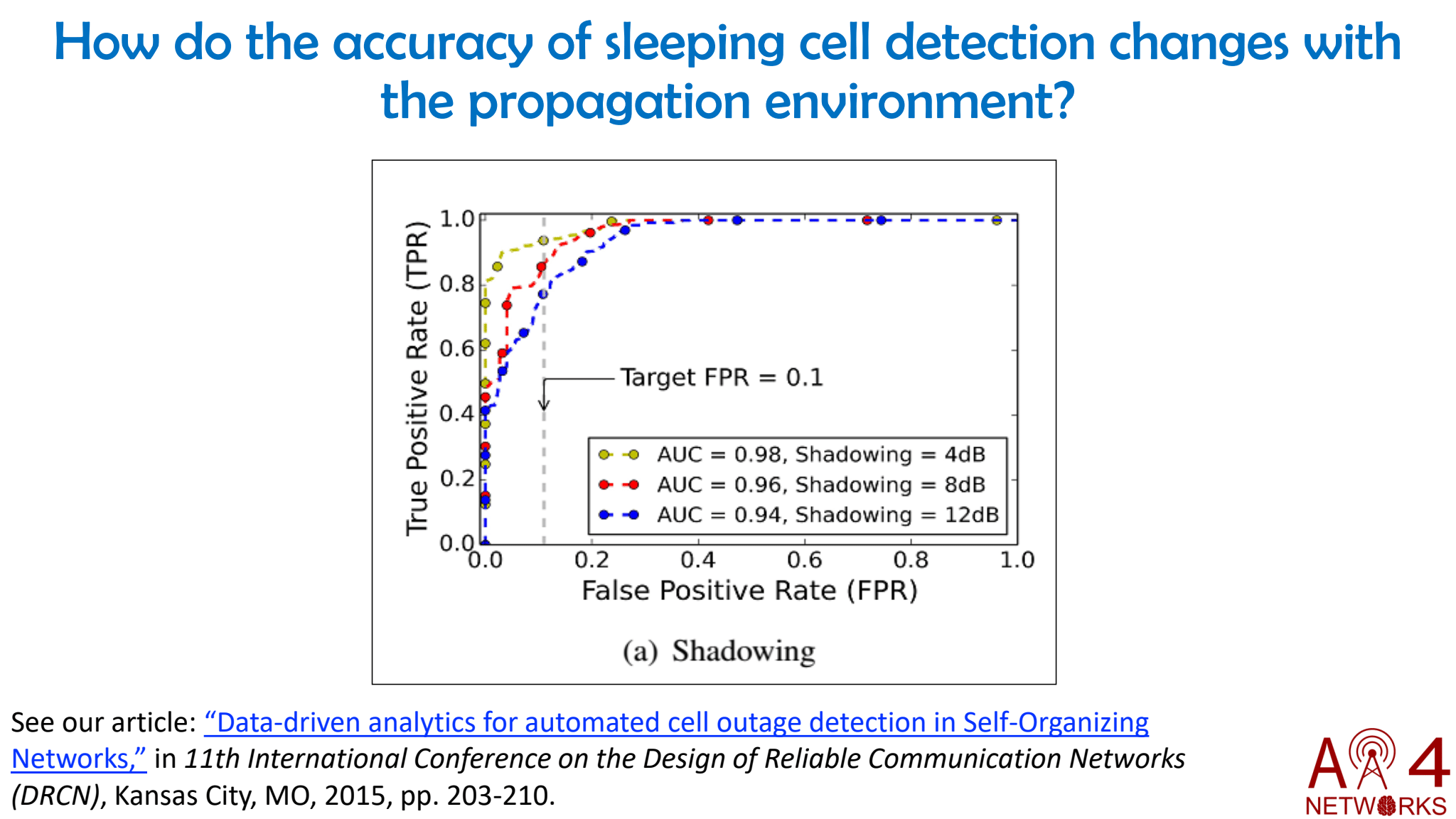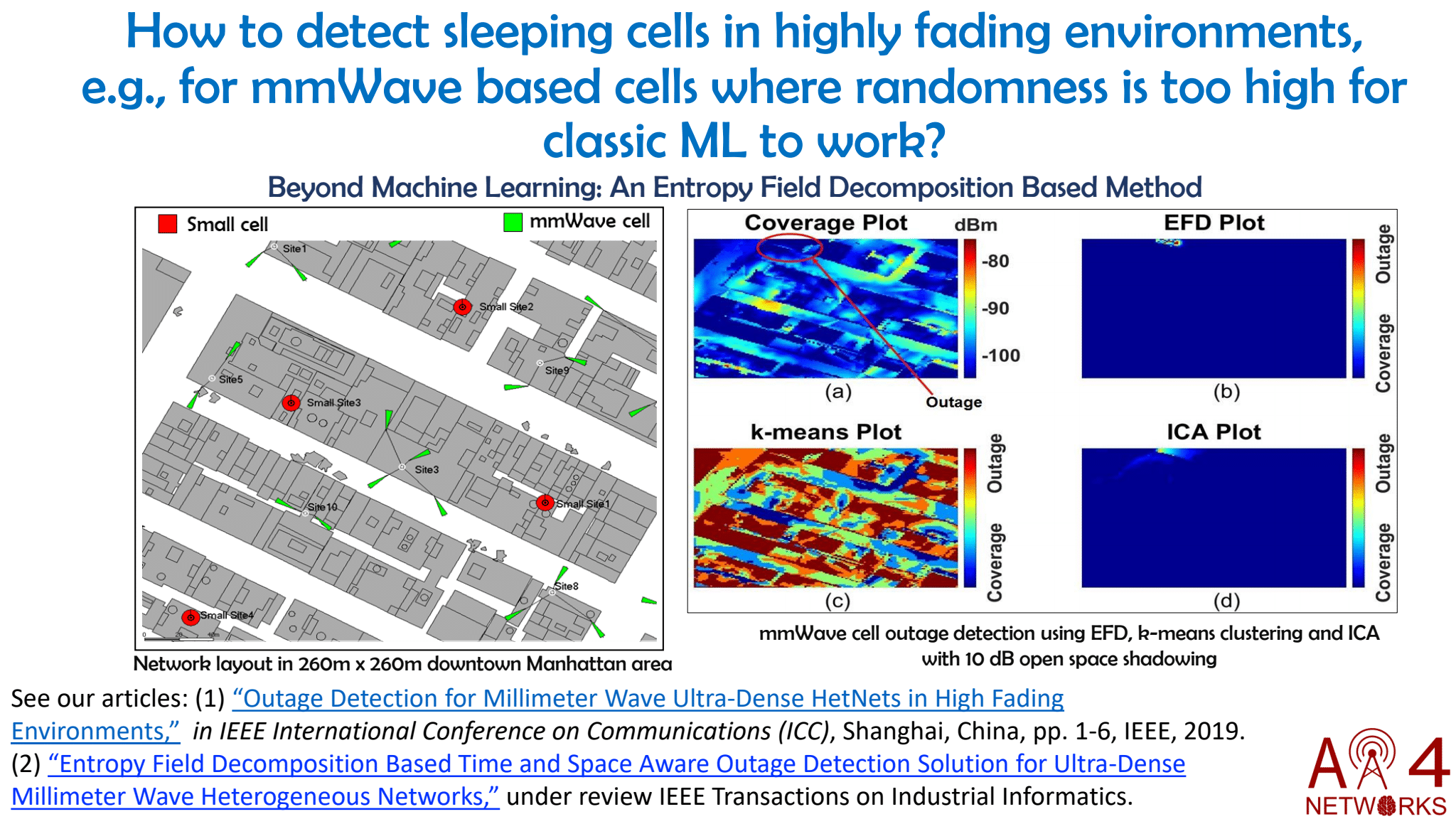Designing Agile and Scalable Self-Healing Functionalities for Ultra Dense Future Cellular Networks
Title: Designing Agile and Scalable Self-Healing Functionalities for Ultra Dense Future Cellular Networks.
Funding: This project is funded by the National Science Foundation of USA, under Award No. 1619346.
Duration: Four years (October 1, 2016 - September 30, 2020)
Funding Amount: $ 500,012.00
The problem addressed by the project
Cellular networks are subject to cell outages, complete as well as partial. A partial outage is where the cell remains active. However, its performance degrades below a reasonable performance level e.g., because of parameter misconfiguration or partial software or hardware failure. The rate of outages is intrinsically proportional to cell density, and complexity of hardware and software that constitute the radio access network. Both of these factors are consistently on the rise from 1G to 5G and are expected to continue to rise beyond 5G. In current cellular networks, drive tests or hardware fault alarms are employed for detecting cell outages; transitory cell outage compensation in the affected area is accomplished with makeshift cell-on-wheel. Such semi-manual approaches to cell outage management have proven inadequate and highly inefficient, even for today’s network. They will cease to be feasible for sustaining future cellular networks marked by ultra-dense cell deployment and mounting operational complexity. Currently, cellular carriers in the US alone spend over $15 billion annually to manage cell outages.
Furthermore, emerging networks are expected to serve use cases that require Ultra-Reliable Low Latency Connectivity (URLLC). Irrespective of advances in physical and MAC layers and adaptation of the new mmWave spectrum in 5G and beyond, the URRLC requirements may not be met with a network with current reactive, time-consuming, and semi-manual approach towards outage detection and compensation. If no intervening measures are taken, cell outages and their management may become a significant challenge for emerging cellular networks, such as 5G and beyond.
Project Goals
To address this challenge, the aim of this project is to develop an Advanced Cell Outage Management (ACOM) framework for automating cell outage detection and compensation in future ultra-dense, heterogeneous cellular networks.
Advanced Cell Outage Management framework integrates three novel set of solutions:
- Autonomous highly agile, Macro Cell Outage Detection
- Autonomous Small Cell Outage Detection
- Autonomous Heterogeneous Cell Outage Compensation
This solution set will offer a complete self-healing framework that, in particular, meets the high agility and scalability requirements of 5G and beyond. This framework will provide a solution for not only complete outages, which are easy to detect, but also for partial outages i.e., sleeping cells. Sleeping cells refer to scenarios where cells remain ON and do not trigger any alarm, but some KPIs fall below the normal level.
A large number of technical challenges are anticipated in the development of this framework. These challenges are being addressed by leveraging advances in machine learning, optimization, chaos theory, and game theory paradigms.

Active Members
PI: Dr. Ali Imran (Principal Investigator)
GRA: Usama Masood (Ph.D. student)
GRA: Muhammad Sajid Riaz (Ph.D. student)
Past Members
GRA: Umair Sajid Hashmi (Ph.D. graduate)
GRA: Ahmad Asghar (Ph.D. graduate)
GRA: Arsalan Darbandi (Masters graduate)
GRA: Haneya Naeem Qureshi (Masters graduate)
GRA: Shruti Bothe (Masters graduate)
Academic Collaborators
Prof. Muhmmad Imran, Rural 5G Hub, University of Glasgow, UK.
Prof. Rahim Tafazolli, 5GIC, University of Surrey, UK.
Industry Collaborators
US Cellular
AT&T
Fujitsu
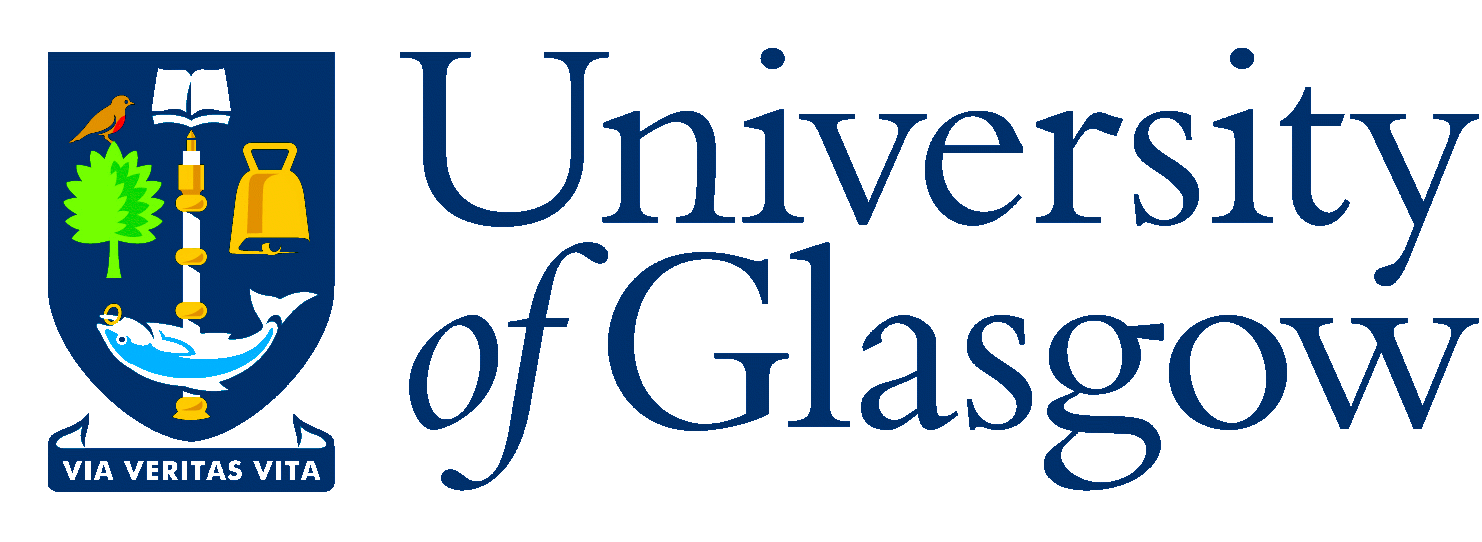

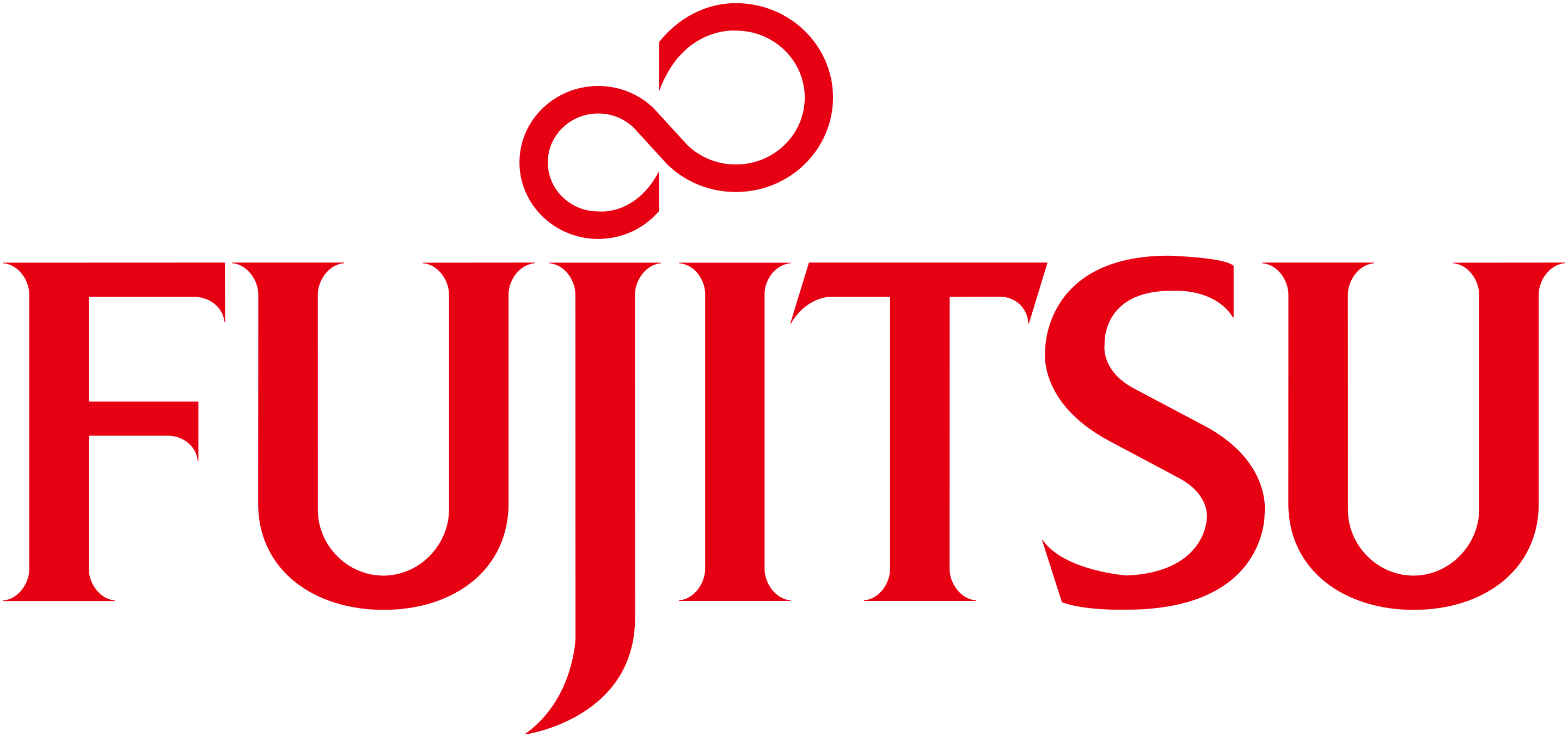


Integration of project outcomes into teaching
The project outcomes are being adapted into following two courses being taught by PI.
- "Emerging Topics in 5G and Beyond" Offered in Sring 2018, 2019 and 2020.
- "Telecommunication Technologies" Offered in Fall 2017, 2018, 2019.
- Courses on cellular system advance concepts including machine learning, Big data analytics were arranged for project students in Fall 2017.
- Courses on machine learning, Big data analytics and stochastic processes were arranged for project GRA in Fall 2016.
K-12 Outreach Program
- PI is running a K-12 outreach program with Booker T. Washington high school, Tulsa. The majority of students in this school belong to underrepresented communities in STEM.
- Through this program several high school students have participated in research being carried out as part of this project and other NSF funded projects.
-
Research conducted by high school students as part of this project has resulted into two IEEE peer reviewed publications given below:
- Y. Kumar, H. Farooq and A. Imran, “Fault prediction and reliability analysis in a real cellular network," 2017 13th International Wireless Communications and Mobile Computing Conference (IWCMC), Valencia, 2017, pp. 1090-1095
- B. Hughes, S. Bothe, H. Farooq and A. Imran, “Generative Adversarial Learning for Machine Learning empowered Self Organizing 5G Networks," in IEEE International Conference on Computing, Networking and Communications (ICNC 2019), Hawaii, Feb. 2019.
For the details of this K-12 outreach program and how to participate see:
Internship opportunities for K-12
Tutorials
- Ali Imran, Moving Towards Zero-Touch Automation, A Key Enabler for 6G: Addressing the Training Data Sparsity/Scarcity Challenge a half day tutorial at IEEE BlackSeaCom 2020, May 26-29, 2020.
- Ali Imran, "Can mmWave, massive MIMO and densification suffice to meet capacity and QoS requirements in emerging IoT?", half day seminar at International Conference on Communications Technologies (ComTech-2017), Pakistan, 19-21 October, 2017.
- Ali Imran "CDSA and BSON: The Two Key Enablers of Lean, Elastic and Proactive Wireless Networks Needed for Future IoT", a half day tutorial to be delivered at 2016 IEEE 3rd World Forum on Internet of Things, Washington DC, 6-8 Dec, 2017.
Keynotes/Invited Talks
- Ali Imran "Addressing the Hyper Parameterization Challenge in AI for Wireless Networks", panel talk at, IEEE Globecom, Dec, 9-13-2019
- Ali Imran "AI enabled Zero Touch automation for 5G and beyond" invited talk, 5G NA, Silicon Valley, Nov 13-14, 2019.
- Ali Imran "5G Networks, AI and Machine Learning Empowering the Enterprise Digital Transformation", keynote in AI for Telcom track at AIWorld, 23-25, Oct, 2019. Boston, MA, 2019.
- Ali Imran "Leveraging Interpretable AI for Reliable Wireless Network Automation" plenary talk at 4th International Conference on UK - China Emerging Technologies (UCET), Aug-22-23, 2019, Glasgow, UK.
- Ali Imran "What AI Can Deliver for 5G and Beyond", keynote at 5G NA, May 8th-9th , 2019, Denver, USA
- Ali Imran "AI for Channel Characterization and Propagation Modelling" keynote at workshop on "AI for MARIE: Are there New Research Opportunities?", April 16th, 2019, Duisburg, Germany.
- Ali Imran "Role of AI in Emerging Networks: 5G and Beyond", keynote at 12th IEEE International Conference on Open Source Systems and Technologies, 19-21, Dec, 2018 (IEEE ICOSST 2018), Lahore, Pakistan.
- Ali Imran "AI for RAN automation: do's and don'ts for industry", plenary talk at RAN USA, Dec 3, 2018, Silicon Valley.
- Ali Imran "Network Automation: Fundamental Challenges, Solution Approaches and Opportunities", invited talk at Summer School Sponsored by IEEE ComSoc and HEC at LUMS, Aug 9, 2018, Lahore, Pakistan
- Ali Imran "On the Role of AI in 5G and Beyond", invited plenary talk at 5G North America , May 14-16, 2018, Austin, Texas, USA.
- Ali Imran "Towards Next Generation AI Enabled SON", invited seminar at T-Mobile HQ, April 16, 2018 Seattle, WA.
- Ali Imran "Future of Open Source Software Defined Big Data Enabled RAN", keynote at 11th international conference on open source system and technologies, Dec 18-20, 2017, Lahore, Pakistan.
- Ali Imran "Big Data Empowered Self Organizing Networks, the Game Changing Paradigm for Enabling 5G", keynote at the International Conference on Communications Technologies (ComTech-2017), 19-21 April, 2017, Pakistan.
International Collaboration Opportunities
- Project students gained international collaboration experience by working with collaborators at:
- 5GIC, Surrey, UK.
- The University of Glasgow. UK.
- The University of Leads, UK.
- One of the project’s student was sent to 5GIC, Surrey, the UK for conducting validation experiments on Testbed in summer 2018.
Conference Attendance by Students
- Project students have attended and presented their work at following conferences
- IEEE 17th Annual Consumer Communications and Networkiing Conference (CCNC), Las Vegas, NV, Jan 2020.
- IEEE PIMRC held in Bologna, Italy, Sep 2018.
- IEEE ICC, Kansas, USA, 20-24 May, 2018.
- IEEE Vehicular Technology Conference (VTC), Toronto, Canada, September 2017.
- IEEE International Conference on Computing, Networking and Communications (ICNC), Silicon Valley, CA, Jan 2017.
Industry Internships
- Project students have interned with the following industry collaborators:
- Bell Labs, NJ in Summer 2018.
- AT&T Big Data foundry, Dallas in Fall 2017.
- AT&T Big Data foundry, Dallas in Spring 2017.
-
Patents
- A. Imran, A. Asghar, and H. Farooq, "Enhancement of Capacity and User Quality of Service (QoS) in Mobile Cellular Networks," , Patent No. 10979932UNITED STATES, Application Date : 06/06/2019, Date Issued : 04/13/2021.
-
Book Chapters
- H. N. Qureshi, and A. Imran, "Towards Realistic Modelling of Drone-based Cellular Network Coverage," a book chapter in book titled “Verticals of 5G”, in press for publication by Wiley, December 2018.
-
Journal Articles
- M. S. Riaz, H. N. Qureshi, U. Masood, A. Rizwan, A. Abu-Dayya and A. Imran, "A Hybrid Deep Learning-Based (HYDRA) Framework for Multifault Diagnosis Using Sparse MDT Reports," IEEE Access, vol. 10, pp. 67140-67151, June 2022, doi: 10.1109/ACCESS.2022.3185639.
- U. Masood, H. Farooq, A. Imran, and A. Abu-Dayya, "Interpretable AI-based Large-scale 3D Pathloss Prediction Model for enabling Emerging Self-Driving Networks," IEEE Transactions on Mobile Computing, January 2022, doi: 10.1109/TMC.2022.3147191.
- A. Asghar, H. Farooq, H. N. Qureshi, A. Abu-Dayya and A. Imran, "Entropy Field Decomposition Based Outage Detection for Ultra-Dense Networks," IEEE ACCESS, January 2021, doi: 10.1109/ACCESS.2021.3056551.
- H. N. Qureshi, A. Imran and A. Abu-Dayya, "Enhanced MDT-based Performance Estimation for AI Driven Optimization in Future Cellular Networks," IEEE Access, September 2020, doi: 10.1109/ACCESS.2020.3021030.
- S. M. A. Zaidi, M. Manalastas, H. Farooq, and Ali Imran, "SyntheticNET: A 3GPP Compliant Simulator for AI Enabled 5G and Beyond," IEEE Access, vol. 8, pp. 82938-82950, May 2020, doi: 10.1109/ACCESS.2020.2991959.
- B. Hussain, Q. Du, A. Imran, and M. A. Imran, "Artificial Intelligence-powered Mobile Edge Computing-based Anomaly Detection in Cellular Networks," IEEE Transactions on Industrial Informatics, January 2020, doi: 10.1109/TII.2019.2953201.
- H. N. Qureshi, and A. Imran, "On the Tradeoffs between Coverage Radius, Altitude and Beamwidth for Practical UAV Deployments," IEEE Transactions on Aerospace and Electronic Systems, vol. 6, pp. 2805-2821, December 2019, doi: 10.1109/TAES.2019.2893082.
- B. Hussain, Q. D. S. Zhang, A. Imran, and M. A. Imran, "Mobile Edge Computing-Based Data-Driven Deep Learning Framework for Anomaly Detection," IEEE Access, vol. 7, pp. 137656-137667, September 2019, doi: 10.1109/ACCESS.2019.2942485.
- S. Bothe, H. N. Qureshi, and A. Imran, "Which Statistical Distribution Best Characterizes Modern Cellular Traffic and What Factors Could Predict Its Spatiotemporal Variability?," IEEE Communications Letters, vol. 23, no. 5, pp. 810-813, June 2019, doi: 10.1109/LCOMM.2019.2908370.
- S. W. H. Shah, M. Rahman, A. N. Mian, A. Imran, S. Mumtaz, and O. A. Dobre, "On the impact of mode selection on effective capacity of device-to-device communication," IEEE Wireless Communications Letters, June 2019, doi: 10.1109/LWC.2019.2901460.
- H. N. Qureshi, and A. Imran, "Optimal Bin Width for Autonomous Coverage Estimation Using MDT Reports in the Presence of User Positioning Error," IEEE Communications Letters, vol. 23, no. 4, pp. 716-719, April 2019, doi: 10.1109/LCOMM.2019.2899094.
- A. Asghar, H. Farooq, and A. Imran, "Concurrent Optimization of Coverage, Capacity, and Load Balance in HetNets Through Soft and Hard Cell Association Parameters," IEEE Transactions on Vehicular Technology, vol. 67, no. 9, pp. 8781-8795, September 2018, doi: 10.1109/TVT.2018.2846655.
- O. Onireti ,A. Imran, and M. A. Imran , "Coverage and rate analysis in the uplink of millimeter wave cellular networks with fractional power control," Journal on Wireless Communications and Networking, August 2018, doi: 10.1186/s13638-018-1208-0.
- A. Asghar, H. Farooq, and A. Imran, "Self-Healing in Emerging Cellular Networks: Review, Challenges, and Research Directions," IEEE Communications Surveys & Tutorials, vol. 20, no. 3, pp. 1682-1709, July 2018, doi: 10.1109/COMST.2018.2825786.
- U. S. Hashmi, S. A. R. Zaidi, and A. Imran, "User-centric cloud RAN: An analytical framework for optimizing area spectral and energy efficiency," IEEE Access, vol. 6, pp. 19859-19875, April 2018, doi: 10.1109/ACCESS.2018.2820898.
- S. Bassoy, H. Farooq, M. A. Imran, and A. Imran, "Coordinated multi-point clustering schemes: A survey," IEEE Communications Surveys & Tutorials, vol. 19, no. 2, pp. 743-764, April 2017, doi: 10.1109/COMST.2017.2662212.
-
Peer Reviewed Conference Papers
- M. S. Riaz, H. N. Qureshi, U. Masood, A. Rizwan, A. Abu-Dayya, and A. Imran, "Deep Learning-based Framework for Multi-Fault Diagnosis in Self-Healing Cellular Networks," IEEE Wireless Communications and Networking Conference (WCNC 2022), pp. 746-751, April 2022, doi: 10.1109/WCNC51071.2022.9771947.
- J. Shodamola, H. N. Qureshi, U. Masood, and A. Imran, "Towards Addressing the Spatial Sparsity of MDT Reports to Enable Zero Touch Network Automation," IEEE Global Communications Conference (GLOBECOM 2021), pp. 1-6, IEEE, December 2021, doi: 10.1109/GLOBECOM46510.2021.9686011.
- J. B. Porch, C. H. Foh, H. Farooq, and A. Imran , "Machine Learning Approach for Automatic Fault Detection and Diagnosis in Cellular Networks," BlackSeaCom, IEEE, May 2020, doi: 10.1109/BlackSeaCom48709.2020.9234962.
- S. Bothe, U. Masood, H. Farooq, and A. Imran, "Neuromorphic AI Empowered Root Cause Analysis of Faults in Emerging Networks," BlackSeaCom, IEEE, May 2020, doi: 10.1109/BlackSeaCom48709.2020.9235002.
- U. Masood, H. Farooq, and A. Imran, "A Machine Learning based 3D Propagation Model for Intelligent Future Cellular Networks," IEEE Global Communications Conference (GLOBECOM), pp. 1-6, IEEE, December 2019, doi: 10.1109/GLOBECOM38437.2019.9014187.
- B. Hughes, S. Bothe, H. Farooq, and A. Imran, "Generative Adversarial Learning for Machine Learning empowered Self Organizing 5G Networks," International Conference on Computing, Networking and Communications (ICNC), pp. 282-286, IEEE, February 2019, doi: 10.1109/ICCNC.2019.8685527.
- H. Farooq, A. Imran, and M. Jaber, "AI empowered Smart User Association in LTE Relays HetNets," IEEE International Conference on Communications Workshops (ICC Workshops), pp. 1-6, IEEE, August 2019, doi: 10.1109/ICCW.2019.8756942.
- A. Asghar, H. Farooq, and A. Imran, "Outage Detection for Millimeter Wave Ultra-Dense HetNets in High Fading Environments," IEEE International Conference on Communications (ICC), pp. 1-6, IEEE, August 2019, doi: 10.1109/ICC.2019.8762054.
- U. Masood, A. Asghar, A. Imran, and A. N. Mian, "Deep Learning Based Detection of Sleeping Cells in Next Generation Cellular Networks," IEEE Global Communications Conference (GLOBECOM), pp. 206-212, IEEE, December 2018, doi: 10.1109/GLOCOM.2018.8647689.
- U. Farooq, U. S. Hashmi, J. Qadir, A. Imran, and A. N. Mian, "User Transmit Power Minimization through Uplink Resource Allocation and User Association in HetNets," IEEE Global Communications Conference (GLOBECOM), pp. 1-6, IEEE, December 2018, doi: 10.1109/GLOCOM.2018.8647409.
- A. Asghar, H. Farooq, and A. Imran, "Concurrent CCO and LB Optimization in Emerging HetNets: A Novel Solution and Comparative Analysis," IEEE 29th Annual International Symposium on Personal, Indoor and Mobile Radio Communications (PIMRC 2018), pp. 1-6, IEEE, September 2018, doi: 10.1109/PIMRC.2018.8580900.
- Y. Kumar, H. Farooq, and A. Imran, "Fault prediction and reliability analysis in a real cellular network," 13th International Wireless Communications and Mobile Computing Conference (IWCMC), pp. 1090-1095, IEEE, June 2017, doi: 10.1109/IWCMC.2017.7986437.
- U. S. Hashmi, A. Darbandi, and A. Imran, "Enabling proactive self-healing by data mining network failure logs," International Conference on Computing, Networking and Communications (ICNC), pp. 511-517, IEEE, January 2017, doi: 10.1109/ICCNC.2017.7876181.
-
Theses (2 Ph.D, 3 MS)
- Addressing training data sparsity and interpretability challenges in AI based cellular networks(Haneya Naeem Qureshi PhD Thesis - 2021)
- A New Paradigm for Proactive Self-Healing in Future Self-Organizing Mobile Cellular Networks (Ahmad Asghar PhD Thesis - 2018)
- AI Based Fault Diagnosis in Emerging Cellular Networks (Shruti Bothe MS Thesis - 2019)
- Large-Scale Data Processing for Detecting Activity Zones in Milan (Arsalan Darbandi MS Thesis - 2018)
- Coverage Analysis of Unmanned Aerial Vehicles Based Netwrok (Haneya Naeem Qureshi MS Thesis - 2018)
-
Prior Work
- O. Onireti, A. Imran, M. A. Imran, and R. Tafazolli, "Impact of positioning error on achievable spectral efficiency in database-aided networks," IEEE International Conference on Communications (ICC), IEEE International Conference on Communications (ICC), pp. 1-6, IEEE, May 2016.
- I. Akbari, O. Onireti, A. Imran, M. A. Imran, and R. Tafazolli, "How reliable is MDT-based autonomous coverage estimation in the presence of user and BS positioning error?," IEEE Wireless Communications Letters, IEEE Wireless Communications Letters, vol. 5, no. 2, pp. 196-199, IEEE, April 2016.
- A. Zoha, O. Onireti, A. Saeed, A. Imran, M. A. Imran, and A. Abu-Dayya, "Outage Detection Framework for Energy Efficient Communication Network," Energy Management in Wireless Cellular and Ad-hoc Networks, Energy Management in Wireless Cellular and Ad-hoc Networks, Volume 50 of the series Studies in Systems, Decision and Control, pp. 3-29, Springer, 15-Jan-2016.
- H. Farooq, M. S. Parwez, and A. Imran, "Continuous time markov chain based reliability analysis for future cellular networks," IEEE Global Communications Conference (GLOBECOM), IEEE Global Communications Conference (GLOBECOM), pp. 1-6, IEEE, December 2015.
- L. Giupponi, and A. Imran, "Self Organizing ICIC for SCN," , Cambridge University Press, December 2015.
- R. H. Aquino, S. Zaidi, D. McLernon, M. Ghogho, and A. Imran, "Tilt Angle Optimization in Two-Tier Cellular Networks. A Stochastic Geometry Approach," IEEE Transactions on Communications, IEEE Transactions on Communications, vol. 63, no. 12, pp. 5162-5177, IEEE, December 2015.
- H. Farooq, M. S. Parwez, and A. Imran, "Continuous time markov chain based reliability analysis for future cellular networks," IEEE Global Communications Conference (GLOBECOM), IEEE Global Communications Conference (GLOBECOM), pp. 1-6, IEEE, December 2015.
- A. Zoha, A. Saeed, A. Imran, M. A. Imran, and A. Abu-Dayya, "A learning-based approach for autonomous outage detection and coverage optimization," Transactions on Emerging Telecommunications Technologies, Transactions on Emerging Telecommunications Technologies, vol. 27, no. 3, pp. 439-450, Wiley Online Library, August 2015.
- H. Y. Lateef, A. Imran, M. A. Imran, L. Giupponi, and M. Dohler, "LTE-Advanced Self-Organising Network Conflicts and Coordination Algorithms," IEEE Wireless Communications Magazine, IEEE Wireless Communications Magazine, vol. 22, no. 3, pp. 108-117, IEEE, June 2015.
- I. Akbari, O. Onireti, A. Imran, M. A. Imran, and R. Tafazolli, "Impact of inaccurate user and base station positioning on autonomous coverage estimation," IEEE 20th International Workshop on Computer Aided Modelling and Design of Communication Links and Networks (CAMAD), IEEE 20th International Workshop on Computer Aided Modelling and Design of Communication Links and Networks (CAMAD), pp. 114-118, IEEE, June 2015.
- O. Onireti, A. Zoha, J. Moysen, A. Imran, L. Giupponi, M. A. Imran, and A. Abu-Dayya, "A cell outage management framework for dense heterogeneous networks," IEEE Transactions on Vehicular Technology, IEEE Transactions on Vehicular Technology, vol. 65, no. 4, pp. 2097-2113, IEEE, April 2015.
- A. Zoha, A. Saeed, A. Imran, M.A. Imran, and A. Abu-Dayya, "Data-driven analytics for automated cell outage detection in Self-Organizing Networks," IEEE 11th International Conference on the Design of Reliable Communication Networks (DRCN), IEEE 11th International Conference on the Design of Reliable Communication Networks (DRCN), pp. 203-210, IEEE, March 2015.
- A. Zoha, A. Saeed, A. Imran, M.A. Imran, and A. Abu-Dayya, "A SON solution for sleeping cell detection using low-dimensional embedding of MDT measurements," IEEE 25th Annual International Symposium on Personal, Indoor, and Mobile Radio Communication (PIMRC), IEEE 25th Annual International Symposium on Personal, Indoor, and Mobile Radio Communication (PIMRC), pp. 1626-1630, IEEE, August 2014.
- A. Imran, and L. Giupponi, "Use of Learning, Game Theory and Optimization as Biomimetic Approaches for Self-Organization in Heterogeneous Networks," Cognitive Communication and Cooperative HetNet Coexistence, Cognitive Communication and Cooperative HetNet Coexistence, pp. 237-268, Springer, June 2014.
- H. Peyvandi, A. Imran, M. A. Imran, and R. Tafazolli, "A target-following regime using Similarity Measure for Coverage and Capacity Optimization in Self-Organizing Cellular Networks with hot-spot," European Wireless Conference, European Wireless Conference, pp. 1-6, VDE, May 2014.
- A. Imran, L. Giupponi, M. A. Imran, and A. Abu-Dayya, "Joint coverage and backhaul self-optimization in emerging relay enhanced heterogeneous networks," IEEE International Conference on Communications (ICC), IEEE International Conference on Communications (ICC), pp. 2671-2677, IEEE, July 2014.
